2012

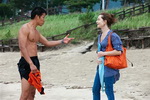


"Architecture 101", "In Another Country", "The Taste of Money", "The Thieves"
Korean cinema opened the year 2012 with a remarkable show of strength. From the Lunar New Year in January until the middle of April, a string of local films held the top spot at the box office, including Dancing Queen, Unbowed, Nameless Gangster, Love Fiction, Helpless, and Architecture 101. Significantly, none of these works qualified as big budget productions, so their dominance at the box office was not only a positive sign for Korean cinema as a whole, but also an indication that midsized commercial films were enjoying a comeback. The diversity in the subject matters and styles of these films was also cause for optimism.
The news on the festival front was also positive. Although no Korean films were selected for Berlin's competition section, a large number of works including Punch and From Seoul to Varanasi screened in other sections of the festival. At Cannes, both Im Sang-soo's The Taste of Money and Hong Sangsoo's In Another Country screened in competition, while independent animated feature The King of Pigs was selected for Directors Fortnight. Korean director Hur Jin-ho and star Jang Dong-gun also were invited to Directors Fortnight with the Chinese language film Dangerous Liaisons.
Looking ahead to the rest of the year, Choi Dong-hoon's The Thieves, firefighting drama The Tower and Soar into the Sun starring Rain will hope to reverse the recent poor performances of big-budget films at the box office. Maverick director Kim Ki-duk returns with Pieta, and a large number of works by somewhat less famous directors will hope to catch a hold of public interest just as the films of the first half of the year did so effectively. (Written on April 25)
Reviewed below: Unbowed (Jan 18) -- Pacemaker (Jan 18) -- Nameless Gangster: Rules of the Time (Feb 2) -- Howling (Feb 16) -- Talking Architect (Mar 8) -- Helpless (Mar 8) -- Gabi (Mar 15) -- Architecture 101 (Mar 22) -- In Another Country (Mar 31) -- As One (May 3) -- Two Weddings and a Funeral (Jun 21) -- Dangerously Excited (Jul 12) -- Two Moons (Jul 12) -- Horror Stories (Jul 25) -- The Thieves (Jul 25) -- The Neighbors (Aug 22) -- Pieta (Sep 6) -- Ghost Sweepers (Oct 3) -- A Werewolf Boy (Oct 31) -- White Night (Nov 15) -- The Winter of the Year Was Warm (Nov 15) -- Juvenile Offender (Nov 22) -- National Security (Nov 22) -- Watcha Wearin'? (Dec 6).
| Korean Films | Nationwide | Release | Revenue | |
|---|---|---|---|---|
| 1 | The Thieves | 12,983,178 | Jul 25 | 93.66bn |
| 2 | Masquerade | 12,319,390 | Sep 13 | 88.90bn |
| 3 | A Werewolf Boy | 6,654,390 | Oct 31 | 46.60bn |
| 4 | The Grand Heist | 4,909,937 | Aug 8 | 34.61bn |
| 5 | Nameless Gangster | 4,719,872 | Feb 2 | 36.54bn |
| 6 | All About My Wife | 4,598,821 | May 17 | 34.22bn |
| 7 | Deranged | 4,515,833 | Jul 5 | 32.18bn |
| 8 | Architecture 101 | 4,111,068 | Mar 22 | 30.22bn |
| 9 | Dancing Queen | 4,058,225 | Jan 18 | 30.13bn |
| 10 | Unbowed | 3,451,025 | Jan 18 | 25.88bn |
| All Films | Nationwide | Release | Revenue | |
|---|---|---|---|---|
| 1 | The Thieves (Korea) | 12,983,178 | Jul 25 | 93.66bn |
| 2 | Masquerade (Korea) | 12,319,390 | Sep 13 | 88.90bn |
| 3 | The Avengers (US) | 7,074,867 | Apr 26 | 59.56bn |
| 4 | A Werewolf Boy (Korea) | 6,654,390 | Oct 31 | 46.60bn |
| 5 | The Dark Knight Rises (US) | 6,396,528 | Jul 19 | 47.64bn |
| 6 | The Grand Heist (Korea) | 4,909,937 | Aug 8 | 34.61bn |
| 7 | The Amazing Spider-Man (US) | 4,853,123 | Jun 28 | 41.16bn |
| 8 | Nameless Gangster (Korea) | 4,719,872 | Feb 2 | 36.54bn |
| 9 | All About My Wife (Korea) | 4,598,821 | May 17 | 34.22bn |
| 10 | Deranged (Korea) | 4,515,833 | Jul 5 | 32.18bn |
* Includes tickets sold in 2013. Source: Korean Film Council.
Seoul population: 10.4 million
Nationwide population: 50.9 million
Market share: Korean 58.8%, Imports 41.2% (nationwide)
Films released: Korean 175, Imported 456
Total admissions: 194.9 million
Number of screens: 2081
Exchange rate (2011): 1126 won/US dollar
Average ticket price: 7466 won
Exports to other countries: US$20,174,950 (Japan: 48.0%)
Average budget: 2.0bn won including 0.7bn p&a spend
Unbowed is based on a true story. One day in 2007, a math professor named Kim Myung-ho took a crossbow and confronted a judge as he was returning home to his apartment. Kim had been fired by his university for pointing out an error committed by his colleagues on the school's entrance exam. Suing for reinstatement, he lost his case after a series of what he believed were highly biased rulings by the judge. His anger finally boiling over, he took a crossbow and waited in the dark stairway of the judge's apartment building.
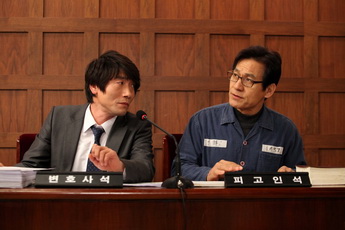 Kim says that he only wanted to scare the judge, and never intended violence. (Interviewed for a recent LA Times Article, Kim said, "Judges believe they are above the law. They're unchallenged, like gangsters, fearing no one. I thought this judge needed to feel fear.") At any rate, a scuffle ensued, an arrow was fired, and the judge was apparently hurt. Kim was charged with attempted murder, and found himself once again at the mercy of Korea's judicial system.
Kim says that he only wanted to scare the judge, and never intended violence. (Interviewed for a recent LA Times Article, Kim said, "Judges believe they are above the law. They're unchallenged, like gangsters, fearing no one. I thought this judge needed to feel fear.") At any rate, a scuffle ensued, an arrow was fired, and the judge was apparently hurt. Kim was charged with attempted murder, and found himself once again at the mercy of Korea's judicial system.
This film, based on interviews, news articles and court records (and slightly embellished -- a point that would later cause controversy), depicts Kim's trial for attempted murder and the efforts of a struggling attorney to defend him. If the professor had felt cynical about biased judgments in his first trial, this one -- in which the victim himself was a judge -- proved to be far more dramatic. With Kim more or less giving up any hope of receiving a fair trial, he takes this opportunity to launch his own legal and moral assault on the courts.
Kim is played by veteran actor Ahn Sung-ki (Radio Star). He once was known for roles like this, and it's exciting to see him once again depict this sort of idealistic, fiercely committed intellectual willing to stand up and speak truth to power. Ahn portrays him not as some kind of persecuted saint, but as a cantankerous, difficult man with faults of his own. Nonetheless, when he goes head-to-head with the judge assigned to his case, one can't help but cheer him on.
Director Chung Ji-young (White Badge) has also assembled a talented group of other actors to fill out the cast. Park Won-sang is great as the attorney arguing on Kim's behalf, and trying to keep him under control. Although his character arc is somewhat predictable, the way he is played is always engaging. Park's character finds an important ally in a journalist played by Kim Ji-ho, and their close (too close?) partnership is one of the film's other highlights. One also has to mention the performance of Moon Sung-keun (Jealousy Is My Middle Name), whose icy portrayal of an arrogant, contemptuous judge is unforgettable.
By sheer coincidence, Unbowed was released just four months after the film Silenced -- another blistering critique of Korean's court system -- rode a wave of viewer outrage to box office glory. It seemed highly unlikely that lightning would strike twice, but apparently, ordinary citizens' anger at the judicial system was enough to support two blockbuster hits. Despite its very modest budget and lack of popular young stars, Unbowed touched off another media firestorm and would ultimately sell an astonishing 3.4 million tickets.
This came as a particular vindication for Chung Ji-young, famous for his iconic works of the early 1990s, but more recently written off by most observers as a has-been director. Without making any attempt to copy the style of the younger generation of directors, Chung has made an entertaining, forceful work that successfully carries the idealism and social concerns of 1990s Korean cinema into the present. The widespread popularity of this film, which out-grossed nearly all of the mega-budgeted genre films of the previous year, has upended many people's most basic assumptions about the Korean audience. Meanwhile, with Chung already planning out his next feature, it seems a career has been reborn. (Darcy Paquet)
I enjoy sports for many reasons. There are the obvious visceral pleasures in witnessing athletic excellence and the emotional pleasures of victory over defeat. (As a former Clevelander, there is also the emotional bond of disappointment in constant defeat. The LeBron-led Cavs have momentarily disrupted this, only to return to the Cleveland baseline of depression during the NBA Championship losses of 2006-7 & 2014-15.) But there are intellectual pleasures as well of sports being a microcosm of political, economic, and social issues pertinent to a particular nation or region. My elevator pitch shorthand about my personal interest in sports has become that I'm more an anthropologist of sport than a fan per se. This is mainly why I have a strong interest in Sports films. They can work off the inherent drama in competition to reveal the social networks that underlie this drama, even when not intentional. And in spite of the somewhat dissatisfying delivery of a Sports drama that is Kim Dal-jung's film Pacemaker, I am able to find intellectual pleasure in the various topics I can mine from its 124 minute running time. (If Pacemaker were an Olympic marathon runner, it would be the 4th fastest time ever.)
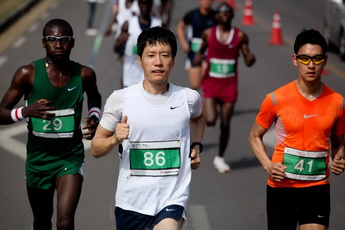 Pacemaker follows down-on-his-luck Joo Man-ho (Kim Myung-min, Sorum, the Detective K series) as he is plucked from his pathetic existence by Park Sung-il (the great Ahn Sung-ki, The Housemaid, Revivre) to be a pacemaker for the rising South Korean pretty boy marathon star Min Yoon-ki (Choi Tae-joon, Eclipse). While preparing Yoon-ki for a possible medal at the 2012 Summer Olympics in London, Joo develops a relationship with flying beauty pole-vaulter Yoo Ji-won (Go Ara, Genghis Khan: To The Ends Of The Earth And Sea, The Magician) and seeks to resolve the resentment his successful younger brother Sung-ho (Choi Jae-woong, The Sword With No Name, The Advocate: The Missing Body) has developed towards him over the years.
Pacemaker follows down-on-his-luck Joo Man-ho (Kim Myung-min, Sorum, the Detective K series) as he is plucked from his pathetic existence by Park Sung-il (the great Ahn Sung-ki, The Housemaid, Revivre) to be a pacemaker for the rising South Korean pretty boy marathon star Min Yoon-ki (Choi Tae-joon, Eclipse). While preparing Yoon-ki for a possible medal at the 2012 Summer Olympics in London, Joo develops a relationship with flying beauty pole-vaulter Yoo Ji-won (Go Ara, Genghis Khan: To The Ends Of The Earth And Sea, The Magician) and seeks to resolve the resentment his successful younger brother Sung-ho (Choi Jae-woong, The Sword With No Name, The Advocate: The Missing Body) has developed towards him over the years.
This film is not a true story. The audience knew this because it was released in January 2012 before the London Summer Olympics took place. Watching the film now, you know it's not based in real life because no Africans claim any medals. (Stephen Kiprotich of Uganda won gold, whereas 2 Kenyans won Silver and Bronze in London that year.) The film hoped to promote box office success from the anticipation of glory in the upcoming Olympics regardless of event. (South Korea ended up tying her record of most medals won - 28 - at the 2012 Olympics and did this with her smallest contingent of athletes since 1992.) In addition, Korea was the Kenya of its day back in the day, so the desire for successful marathoners has historical roots.
Utilizing the pacemaker as a focal point is an interesting angle since pacemakers are one of the roles in sport that belie the myth of the self-made man. (And the sexism in the cliche 'self-made man' exposes the myth as well in that these men could position themselves to succeed because they can ignore the daily everyday, mostly unpaid, tasks society demands of women. Behind every successful man is subsidization through the poorly paid labor of women, even more so in sport as Shona M. Thompson's criminally under-appreciated book Mother's Taxi: Sports and Women's Labor details.) Pacemakers assist the premier runners to maintain the pace in the first 30 kilometers necessary to have a chance at winning the 42.195 kilometer race. There are examples of such auxiliary roles throughout sport. Minor league baseball players who never make it to the big leagues who help star players develop, just as practice batters help professional bowlers in cricket. Cycling would not be the sport it is without the drafting relief offered by the also-pedals making up the peloton. These roles are part of the vast interdependent infrastructure of invisible labor that makes excellence in sport possible.
But Pacemaker the film wants more from its pacemaker. We are led to believe fulfilling this valuable role is not valuable enough. Man-ho's younger brother wants more from his older brother to regain the respect from him he lost. We are led to believe Man-ho has greater potential because the sexualized Ji-won takes a romantic interest in him. (Yet, ironically, this interest is maintained because Man-ho primarily validates her athletic desires over amorous ones.) We ask Sports films to fulfill these aspirational needs of underdog success partly to salve the structural realities that limit such realization in the real world. To get this filmic fulfillment, the movie cuts some corners. It's never really clear when Man-ho actually qualified for the Olympics. It's never really clear why Bong-Jo (Abu Dodd, Haunters) is kept on the squad when he keeps having medical issues before races that cause him to pull out.
Speaking of Dodd, this is his second film after his excellent debut role in Haunters. As a Ghanaian with Korean fluency, his (hopefully) growing presence in South Korean cinema, along with his compatriot Samuel Okyere (aka SoKo), is a wonderful disruption of stereotypes of successful foreigners in South Korea. Further disrupting political assumptions is that his character is South Korean-born, not an immigrant nationalized for sporting success at international events. Yet this role falls close to stereotypes of blacks that are part of cultural flows emanating from the United States such as those Nadia Y. Kim explicates in her important book Imperial Citizens: Koreans and Race from Seoul to LA. Bong-Jo's inclusion seems primarily for comic relief by presenting him as constantly in pursuit of female athletes while vocalizing his uncontrollable desire for them. This sexual harassment of fellow female athletes is contextualized falsely as harmless fun. It apparently needs to be underscored, and thus ruin the attempted humor, that these female athletes are employees facing this harassment at work.
As this filmic marathon finishes, one realizes that like so many films, like so many professional athletes, Pacemaker is not excellent but it is also not mediocre. (Whenever you have Ahn Sung-ki in your film, you've already pole-vaulted above mediocrity.) One way to lift this film above its station is to bring in Sports Studies scholarship as outside reading to enhance the drama on display. Just as reading the writing of Samir Chopra has helped me better appreciate cricket, reading sports scholarship can make Pacemaker perform better on screen. Consider it 'intellectual doping', an enhancement even the International Olympic Committee should allow. (Adam Hartzell)
![]() Nameless Gangster: Rules of the Time
Nameless Gangster: Rules of the Time
There are some films that are constructed around a single iconic character. And for all its dramatic storyline, expansive cast of interesting characters, and memorable setting, Nameless Gangster: Rules of the Time ultimately boils down to Choi Ik-hyun. He's a middle-aged man from Busan, with no special talents or abilities other than a certain shamelessness and a willingness to use personal connections to get ahead in life. He's the type of personality that is usually a supporting character in other films. But there's a reason he plays such a central part in this story: this is a film that illustrates how power is exercised in Korean society. And few things matter more in Korean society than personal connections.
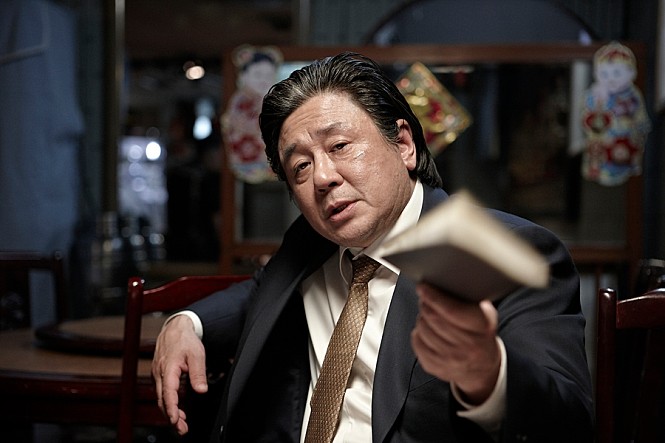 The talented veteran actor Choi Min-sik (Oldboy) makes little effort to portray Choi Ik-hyun as a likable person. At the start of the story he is a customs officer who demands bribes whenever he can, and keeps piles of cash hidden away from view. But one day he comes across a large stash of methamphetamine. Determined to get as much benefit from this windfall as possible, he arranges to meet the local gangster Choi Hyung-bae (Ha Jung-woo) to ask him to broker a deal with the Japanese yakuza. But the real windfall comes when he discovers that he and Hyung-bae are part of the same Gyeongju-based Choi family clan. Quitting his job, he re-establishes himself as a businessman and uses this family connection to impose himself on the gang and enrich himself.
The talented veteran actor Choi Min-sik (Oldboy) makes little effort to portray Choi Ik-hyun as a likable person. At the start of the story he is a customs officer who demands bribes whenever he can, and keeps piles of cash hidden away from view. But one day he comes across a large stash of methamphetamine. Determined to get as much benefit from this windfall as possible, he arranges to meet the local gangster Choi Hyung-bae (Ha Jung-woo) to ask him to broker a deal with the Japanese yakuza. But the real windfall comes when he discovers that he and Hyung-bae are part of the same Gyeongju-based Choi family clan. Quitting his job, he re-establishes himself as a businessman and uses this family connection to impose himself on the gang and enrich himself.
Nameless Gangster: Rules of the Time was a breakthrough for director Yoon Jong-bin. With over 4.7 million tickets sold, it was the highest grossing film of early 2012, and received a rapturous response from local critics. Many viewers praised the work for exposing something truthful, albeit slightly shameful, about the way things work in Korean society. Although set in the 1980s and 1990s (the effective use of period details and costumes are quite memorable) the social dynamic it portrays feels in many ways just as relevant to the present day.
But it would be wrong of me to focus only on one character, and to speak only of the performance of Choi Min-sik. The ensemble cast in this film is extraordinary, and it features many actors who have since gone on to become much more famous than they were in 2012, including Ma Dong-seok (Train to Busan), Cho Jin-woong (The Handmaiden), Kwak Do-won (The Wailing), Kim Seong-gyun (Fengshui), and many other recognizable faces. And of course I must also mention Yoon Jong-bin's regular collaborator Ha Jung-woo, whose portrayal of Hyung-bae the gangster is disarmingly human, without ever downplaying his potential for violence.
In many ways Nameless Gangster doesn't feel quite like a gangster film. Although many of the familiar ingredients are there in the plot, from knife fights and hit jobs to unexpected shifts in loyalty, ultimately Yoon Jong-bin is less interested in playing with genre conventions than he is in digging into power structures and social dynamics. There's a realism in this film that slightly undercuts its glossy commercial surface. At the same time that it entertains, it leaves you with a lot to think about. It's little wonder that as other gangster movies fade from memory, this one still feels fresh a decade later. (Darcy Paquet)
Before I begin, I am compelled to point out that the practice of naming brand-new Korean movies after well-known Euro-American titles is really getting out of hand. Producers, stop doing this now. You think non-Korean viewers won't notice? Don't you know your movies will show up at the Netflix or Hulu Plus streaming catalogue within, what, half a year from the domestic opening date? Did the makers of Howling really want their film to be confused with Joe Dante's classic tale of the lycanthropic mayhem in '70s California (or for that matter, the latter's notoriously dorky sequels)?
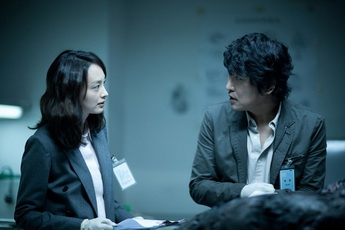 In any case, as dutifully noted here, Howling is not a werewolf film, in fact not even a horror flick. It turns out to be a polished, fast-paced but ultimately rather depersonalized roman policier variation on the theme of Samuel Fuller's White Dog (1982); the tragedy of an innocent animal trained to become a conduit of man's hatred against fellow men. Megastar Song Kang-ho (The Host) plays Sang-gil, a tired cop investigating a strange murder case that seems to involve spontaneous combustion. Out-promoted by his sleazy colleague and despised by his teenage children, Sang-gil is saddled with a rookie patrol-woman Eun-young (a surprising cast choice Lee Na-young, the object of romantic obsession in Someone Special and also in Who Are U?) trying to make it as a detective. As expected, the two do not exactly hit it off famously but soon find themselves buried neck deep in the increasingly bizarre case, as more victims turn up with their throats gouged open, allegedly attacked by a wolf-like animal. A wolf voluntarily stalking and assassinating human targets? Right smack in the streets of South-of-River Seoul?
In any case, as dutifully noted here, Howling is not a werewolf film, in fact not even a horror flick. It turns out to be a polished, fast-paced but ultimately rather depersonalized roman policier variation on the theme of Samuel Fuller's White Dog (1982); the tragedy of an innocent animal trained to become a conduit of man's hatred against fellow men. Megastar Song Kang-ho (The Host) plays Sang-gil, a tired cop investigating a strange murder case that seems to involve spontaneous combustion. Out-promoted by his sleazy colleague and despised by his teenage children, Sang-gil is saddled with a rookie patrol-woman Eun-young (a surprising cast choice Lee Na-young, the object of romantic obsession in Someone Special and also in Who Are U?) trying to make it as a detective. As expected, the two do not exactly hit it off famously but soon find themselves buried neck deep in the increasingly bizarre case, as more victims turn up with their throats gouged open, allegedly attacked by a wolf-like animal. A wolf voluntarily stalking and assassinating human targets? Right smack in the streets of South-of-River Seoul?
So okay, the premise is not exactly the most believable, but, its irritating copycat (copy-wolf?) title notwithstanding, Howling is pleasingly well put-together. Director Yu Ha (A Dirty Carnival, Marriage is a Crazy Thing) has never made a boring movie and is not about to start with this one. Working from the Japanese author Nonami Asa's source novel, Yu sculpts his narrative into a lean, muscular sprinting machine, jettisoning any excess romantic baggage from the proceedings and rendering the characters life-sized and credible. While the film's mystery plot is ultimately no big shakes, Yu, collaborating with his staff, including the super-veteran editor Pak Kok-ji, DP Kong Pyong-jae and Lighting Supervisor Kang Dae-hee, keeps the machine well-oiled and humming along nicely (no herky-jerky shaky-cams, thank God). On occasion he flexes his muscles and manages to sucker-punch the viewers with memorable set pieces, including the stunning scene in which Eun-young witnesses the alleged "wolf" killing a woman with the precision and grace of a veteran sniper.
The casting of Lee Na-young turns out to be the film's riskiest gamble. Even more so than Bae Doo-na, Lee radiates ethereality, a porcelain doll aura that serves her perfectly as the "It" girl in, say, Someone Special, but sets her apart from the typical Korean cops, as if a unicorn wandered in the midst of a herd of Mastodons. Yu actually takes advantage of this incongruity, however, and compels us to identify with Eun-young in her struggle to survive the gauntlet of infuriating put-downs, snide "jokes" and outright sexual harassment her male "colleagues" throw in her way.
Lee rises to the occasion by carefully modulating her performance. Her Eun-young is neither perky and cute nor morosely obdurate: she is simply a good professional who likes her job, has no axes to grind against an evil boyfriend or an abusive father, and is realistic about the extent of her ability to challenge or transform the odiously dick-worshipping status quo. Knowing something about how Korean men usually behave in a similar work environment, I must say that none of the abuses and harassment Eun-young has to endure in the film strikes me as exaggerated beyond real life, but all the same be warned that some of you might find all this far more disturbing than any cinematic depiction of blood and gore, and that her character arc is resolved in a manner far more authentic than the kind of knee-in-the-male-chauvinist-balls cathartic ending that would have graced a more crowd-pleasing Hollywood actioner.
Song Kang-ho is, as usual, warm and funny and does here what he does better than any other Korean actor of his caliber, i.e., generously serving as a perfect foil for his female co-star (and of course, delivering one-liners with supernaturally impeccable timing, guaranteed to elicit the laughter of relief from the viewers every time). A special mention should be given to the canine "villain's" great performance: his/her wrangler deserves some kind of an award. The turquoise-eyed animal's beautiful, majestic presence contributes greatly to the film's overall atmosphere of uncanny tragedy.
Unfortunately, Howling suffers from director Yu's apparent desire to subordinate almost all elements of the film to telling the story. A few of his choices, such as Eun-young's half-hearted narration and the usual gotta-show-what-really-happened-in-30-seconds flashback montage, either are wholly unnecessary or end up hampering our emotional investment in the characters. I am usually the one to pan self-consciously artistic touches that call attention to themselves in a genre film like this, but in this particular case Yu Ha could have relaxed the pace a little and allowed some contemplative, or even lyrical, moments to linger in the viewer's memory.
Howling is an entertaining package that pushes all the right buttons for the viewers and does so expertly. Yet, like Frozen Flower, Yu's previous work, the film feels excessively reined in, as if its director could not trust himself to be sidetracked. In the end, though, the fleeting and sorrowful bond between Eun-young and the canine "monster"-the beauty and the beast, as it were -might have deserved a little more exploration than it actually receives in Yu's hands. But we definitely wouldn't mind seeing this deceptively demure, smart cop again in another vehicle designed for her. (Kyu Hyun Kim)
Jeong Jae-eun's debut feature Take Care of My Cat is still one of my favorite South Korean films. Although critically appreciated, it did not do well in its initial run, taking efforts by fans to bring it back to the theaters. It still stands as an important work of New Korean Cinema. Her sophomore feature, The Aggressives, however, performed poorly, and this time there was no call for the film to return to screens. Afterwards, Jeong took a feature-length hiatus. I have been anxiously awaiting Jeong's return ever since. She's one of those directors whose films I would watch, regardless of the topic. As the old saying goes, I would watch her film paint drying.
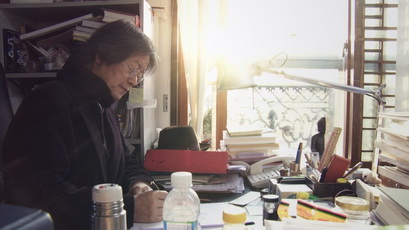 But Jeong went one further, she waited for the paint to dry on and in the sides of the building before she began filming again after a 7-year absence. She has taken on the topic of architecture and an architect in the documentary Talking Architect, where she follows South Korean architect Chung Guyon. Surprisingly, considering the niche-ness of the topic, the documentary garnered over 30,000 admissions, beyond impressive for a documentary in South Korea.
But Jeong went one further, she waited for the paint to dry on and in the sides of the building before she began filming again after a 7-year absence. She has taken on the topic of architecture and an architect in the documentary Talking Architect, where she follows South Korean architect Chung Guyon. Surprisingly, considering the niche-ness of the topic, the documentary garnered over 30,000 admissions, beyond impressive for a documentary in South Korea.
I was happy to see Jeong show us immediately that she wasn't going to take a hagiographic approach such as we find in the documentary on British architect Norman Foster, How Much Does Your Building Weigh, Mr. Foster? (Carlos Carcas & Norberto Lopez Amado, 2011). Quickly we witness Chung go all diva on two of the projects he tours for folks. Chung is irate that his vision was disrupted in two separate buildings he designed in Muju by the audacity of someone putting up solar panels without asking him first. Initially it's not clear if he hates the whole idea of solar panels or if his ego is simply wounded. But he clarifies in the second instance that the solar panels obstruct the sun from hitting a section of the wisterias that make his Muju public stadium project so delightful. Solar panels are necessary for our future energy security, but Chung has a point here.
In addition to his solar upset, Chung is not fond of Zaha Hadid's design for the Dongdaemun Design Plaza and Park. His comments here come off as slightly petty, since his project wasn't chosen. But there are valid critiques against our starchitecture moment in history. (Here's some of mine - how are you going to clean all those nooks and crannies and how will snow or ice fall from such a curvaceous structure?) But even if you speak disparagingly of Hadid's 'UFO', I can't agree with the claims that she was selected 'only' for the money. Whatever your opinion on the finished project, I don't see how you can disagree with Robert J. Koehler's recent (March, 2014) about the pretty cool staircase.
But Chung would never be a starchitect. His buildings won't stand out. His philosophy wouldn't allow for it. In one scene, Chung sums up his philosophy on a blackboard - "Both the problems and the solutions are inherent in the land." This is a wonderful aphorism on which to focus one's work. Such allows one to work within the box rather than demand we step outside of it. One works with nature and the land, not against it. Problems become challenges and answers are found within the same space where they arise. The value of such an approach is demonstrated in the gorgeous library where Chung enabled the tree to be part of the building rather than uprooting the tree. Chung probably could have found a similar way to incorporate the solar panels to better fit with the buildings and their surroundings. Sometimes we diva because, à la Beyoncé, we woke up like this. Chung's designs have shown he can work within constraints as long as you tell him what those constraints are.
As further evidence that Chung can work within the box, although there is tension between him and Ilmin Museum of Art curator Kang Sungwon, he is clearly aware of her constraints that might require restrictions on his visions. These meetings with the staff at Illmin planning a retrospective of his work are some of the more compelling for me because his respect for those individuals, most of whom are women, is a wonderful digression from assumptions about the sexism of old-boys-networks like architecture. Chung relents when he realizes these women have just as much a job to do in preparing the exhibit as he does in designing a building. And also to Chung's credit, he isn't always upset with modifications of his work like in Muju, as we witness his acceptance of a wall being torn down in one of the homes he had built for a patron.
Sure, his willingness to compromise with the art museum staff is also impacted by his growing awareness that he is not long for this world. The fact that we watch Chung's condition deteriorate throughout the documentary adds a layer to the story that was possibly not presumed from the beginning. Like Chung, Jeong finds her 'solutions' within the story that presents itself to her. Chung jokes how his medical treatment and condition causes him to look like a monk, but I indeed found myself conscious of my breath while watching Chung's exhaustion within the film, as if the film itself were a meditative practice.
Jeong has created an wonderful documentary about a figure who has made an impact on South Korean architecture without the flash of the panels of the starchitect. The focus on the An Seong Community Center bath he made for the residents of Muju is a wonderful highlight of this man's work. Although he has his moments of grandeur like others of his profession, there's a refreshing unassuming nature in the images of him sitting along the steps with the everyday elderly of Muju enjoying what he helped bring to realization in their town, a place where you can relax in your surroundings, feeling as if you belong, feeling held comfortably within a building that itself belongs. (Adam Hartzell)
Jang Mun-ho (Lee Seon-gyun, Paju, Oki's Movie) and Cha Kyung-seon (Kim Min-hee, Asako in Ruby Shoes, The Actresses) are a happy couple, about to be married. While Mun-ho is picking up a cup of coffee at a highway depot, Kyung-seon receives a suspcious telephone call. When Mun-ho returns to the car, he finds his wife-to-be missing without a trace. Frustrated by the lack of enthusiasm by the police, he asks his ex-cop cousin Jong-geun (Cho Sung-ha.. Bleak Night, Yellow Sea) to investigate her disappearance. Unfortunately, what the latter gradually uncovers is more disturbing news: that Cha Kyung-seon was her assumed identity, and that she may harbor some seriously dark secrets.
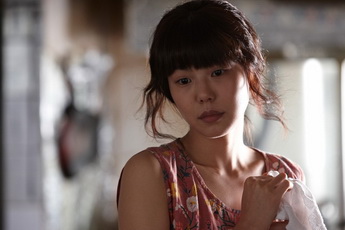 One of the less commented-on phenomena in relation to the Korean genre cinema in recent years is the latter's increasing reliance on Japanese-language sources, especially novels. The popularity of Japanese novels among Korean readers is not really a new trend, to be sure: neither is it confined to specific genres. It is not difficult to find loyal devotees of Murakami Haruki, Ekuni Kaori or Shiono Nanami rushing to hoard the freshly printed copies of his or her latest release in any major bookstore in Seoul. And as a historian, I cannot resist pointing out that Koreans have always read a huge amount of Japanese novels from the colonial period without break to the new century, despite the loud anti-Japanese protestations that come and go with political needs of the times. The roster of Japanese writers whose works have been adapted into recent Korean motion pictures include Nonami Asa (The Freezing Fang, made into Howling), Higashino Keigo (Into The White Night and Devotion of Suspect X, both re-made in the Korean language), Kaneshiro Kazuki (Fly, Daddy, Fly) and Kishi Yusuke (Black House). If one includes manga in the list of original sources, it gets even longer, with significant hits such as Oldboy and 200 Pounds Beauty turning out to be based on Japanese comics.
One of the less commented-on phenomena in relation to the Korean genre cinema in recent years is the latter's increasing reliance on Japanese-language sources, especially novels. The popularity of Japanese novels among Korean readers is not really a new trend, to be sure: neither is it confined to specific genres. It is not difficult to find loyal devotees of Murakami Haruki, Ekuni Kaori or Shiono Nanami rushing to hoard the freshly printed copies of his or her latest release in any major bookstore in Seoul. And as a historian, I cannot resist pointing out that Koreans have always read a huge amount of Japanese novels from the colonial period without break to the new century, despite the loud anti-Japanese protestations that come and go with political needs of the times. The roster of Japanese writers whose works have been adapted into recent Korean motion pictures include Nonami Asa (The Freezing Fang, made into Howling), Higashino Keigo (Into The White Night and Devotion of Suspect X, both re-made in the Korean language), Kaneshiro Kazuki (Fly, Daddy, Fly) and Kishi Yusuke (Black House). If one includes manga in the list of original sources, it gets even longer, with significant hits such as Oldboy and 200 Pounds Beauty turning out to be based on Japanese comics.
There is nothing strange or even particularly trendy about the filmmaker's choice to rely on Japanese sources. Especially regarding genres such as mystery, thriller and horror, Japanese writers are known for their steady and dense plotting, interesting ideas and clarity of prose. It strikes me as a matter of rational choice that Korean producers turn to these readily available resources. However, there are inevitably cultural differences that come into play in adapting these novels. For instance, I feel that the kind of deliberate, phlegmatic and therefore more psychologically complex characterizations of the better Japanese novels are sometimes diluted in Korean adaptations.
I confess that when I first approached Helpless, based on Miyabe Miyuki's novel (Its title, The Fiery Chariot, carried over to the Korean moniker, makes little sense in the latter context: it has been translated into English, by the way, in 1999 as All She Was Worth), I had trepidations about its potential mishandling of the protagonist, as well as insertion of "humanistic (or anti-capitalist?)" agenda as understood by some Koreans, that often in subtance results in cranking up melodramatic effects. I had some faith, however, in that the helmer was Byun Young-joo (Ardor, Flying Boys), who, whatever shortcomings she might have been accused of, had not been known to peddle macho heroics or pat sentimentalism.
In my view, at least, my trust in Byun's directorial acumen has paid off. Helpless is a good thriller but, more than that, a terrific psychological mystery, an inversion of a film noir like Scarlet Street wherein the femme fatale dominate the narrative, and, despite initial misgivings, a successfully mounted tragic love story that culminates in a satisfying resolution.
There is no denying, of course, that Helpless is an obviously Korean adaption. To begin with, the role of the husband-to-be, Mun-ho, has been greatly expanded. In the source novel, this character is at best a passive observer, a somewhat crass and superficial individual. In the film, Mun-ho is the de facto protagonist, and much of the film's suspense is generated by the audience's anticipation of how he would respond if he comes face to face with Kyung-seon again (not surprisingly, the film builds towards that encounter, rather than apprehension of Kyung-seon by the law, as its real climactic moment). Byun, who also authored the tightly structured screenplay, pulls off a delicate balancing act between rendering Kyung-seon sympathetic on the one hand and keeping her mysterious and unnerving on the other: she indulges only once in a brief Grand Guignol moment, which may be considered a misstep but is not jarring enough to destroy the carefully orchestrated tone of melancholy.
In a sense, Byun has made the right choice in refusing to directly explore Kyung-seon's inner world and instead using Mun-ho as the audience stand-in. We have to work towards understanding Kyung-seon, along with Mun-ho. As she did in Ardor, a bona fide feminist film that I feel has never been properly appreciated by Korean critics, Byun puts the character interactions in the front and center, at the expense of flamboyant stylistics or huffing social criticism (although she faithfully recounts from Miyabe's novel excruciating details of the merciless credit-and-finance machine that masticates one character into bloody pulp). Both Lee Seon-gyun and Kim Min-hee are wonderful in the roles that easily could have slided into historionics or, conversely, mannequin-like passivity. I particularly liked that Kim's blank face is never given the kind of cinematic stylization that marks her as a representation of (clandestinely glamorous) psychosis, a "cool" evil, as some among the more so-called artistically-oriented filmmakers might have done (Kim Ki-duk will never make a movie like this in a million years, either, and that's a good thing).
It is the measure of Helpless's emotional power that, by the time the climactic encounter set at Yongsan Station rolls out, we are genuinely gripped by the question that asks if Kyung-seon had any inkling of love for Mun-ho, rather than how the movie will end in the conventional sense. Helpless may not make you sweat in your palm, but its calm, unswerving gaze directed at a frightening yet sympathetic femme fatale ultimately stirs your heart more than the button-pushing melodramatic excess ever could. (Kyu Hyun Kim)
Gabi (a turn-of-the-century Chinese-character transliteration of coffee), is based on Kim Tak-hwan's novel, concerning a certain Kim Hong-ryuk. Born into a lowly background, Kim rose up in the ranks to be appointed as an interpreter for Emperor Kojong in the latter's dealings with the Russian minister Karl Ivanovich Weber. Eventually his political ambition proved his undoing, and he was executed for allegedly trying to poison Kojong by spiking a cup of coffee with opium.
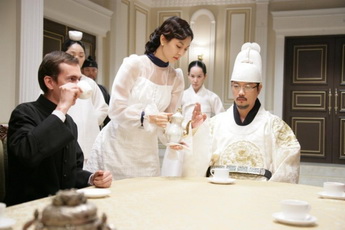 The author Kim Tak-hwan, however, borrowed only a few key motifs from the real history to fashion an entirely new, heavily fictionalized roster of characters. Kim Hong-ryuk is upgraded into an international con-man named Ivan, now with a female partner, Tanya, who in the end seems to usurp the position of protagonist from the former.
The author Kim Tak-hwan, however, borrowed only a few key motifs from the real history to fashion an entirely new, heavily fictionalized roster of characters. Kim Hong-ryuk is upgraded into an international con-man named Ivan, now with a female partner, Tanya, who in the end seems to usurp the position of protagonist from the former.
The novel is reasonably entertaining but not earth-shakingly so. The problem is that, no matter how freewheeling its fictional characters behave, they still remain subordinate to the main event of the plot, the attempted assassination of the Korean monarch. It is not as if Kim has many interesting stories to tell besides that. In the beginning, the unusual characters hold the reader's interest but as the book draws to a close, it ends up leaving him or her with the question, "Wait, was that all?"
The real reason that the novel was so popular, enough to be adapted into a major motion picture, is probably its exotic and fashionable characters and settings. After all, the protagonist, Tanya, is a turn-of-the-century Korean woman but also a genuine cosmopolitan, fluent in several languages, who also happens to be Korea's first barista in charge of serving coffee to the king, including the poisoned cup that could have changed the modern history of Korea. All this reminds one more of a chicly retro-fashion photo spread in Elle Korea rather than a serious historical drama. As such, it is not surprising at all that many thought the adaptation would appeal to the contemporary Korean viewers.
In adapting this novel into a movie, there were certain advantages and disadvantages.
To begin with, Tanya is indeed a fun protagonist, or at least is full of potentials to be one. Amoral and confident, she is entirely free from the burdens such as patriotism or romantic love that drag down other heroines in similar settings. Have we ever seen a female character like this in a historical drama set in late 19th century? I think not. Likewise, some interesting subject matters excavated from the cultural history of Korea, such as Kojong's love for "Western" consumer habit like coffee-drinking, have never been treated with the care and attention they deserve. With a dash of espionage and political conspiracy, all this could have resulted in something truly unique and fascinating.
Alas, the subject matter is also dangerous, especially for us Koreans who, let's admit it, are simply not good at handling multi-cultural and multi-lingual settings or characters. The problem is compounded when the movie is set during the short-lived Korean Empire, which automatically tends to elicit nationalistic anger from us. Now I am also a product of Korean education so I do understand why such an emotional response inevitably becomes a factor, but there is no denying that after a while it begins to work against the task at hand, in the same way that a smut filmmaker excessively turned on by his subject cannot make a good piece of pornography.
Unfortunately little of the advantages delineated above are partaken by the film version directed by Chang Yoon-hyun (Some, Hwang Jin-Yi). Now director Chang may not have been responsible for all of the film's bad choices, but it is still mystifying how he could have been so blind to those devices and materials that distinguish Gabi from any run-of-the-mill patriotic historical melodrama. I won't go into detail about the (further tinkered from the fictionalized account in the novel, mostly for the worse) story of Tanya and his lover (now called Illyich) except to note that the two protagonists indeed end up as two textbook-model patriots, fairly shaking with self-righteous rage against the evil foreigners.
Again, I have nothing against angry patriots as heroes of a commercial movie. But they do have to meet a few conditions to be meaningful characters. First, a minimum level of depiction of their psychology that shows the reasons for their life-choices is required. If that is too much to ask, then at least build a character whose expression of such righteous anger is itself arresting to behold. In either case, their backstories have to make sense from the viewer's vintage point.
The film version of Gabi completely ignores these basic conditions. The upshot is that its characters have no free will or personalities of their own. Neither is any absorbing drama constructed out of the new motivation for Tanya and Illyich that renders these two the victims of coercion rather than voluntary agents for their acts of espionage. The freshness of subject matter is totally lost, the story now reduced to a devastatingly weepy tear-jerker.
Any scene from the novel that could have made potentially interesting cinema has been cut out. I can take some of these choices, but why did the filmmakers, for instance, choose to ignore a scene in which Tanya coolly blows up her enemies with the explosives inherited from her father? These details are what make her character interesting in the first place. The case of Illyich is even worse. In the source novel, he is a poker-faced villain whose charm is precisely that his motivations are never clear. In the movie, he is just a bundle of self-justifications and melodramatic clich?s, yet made to preen like a peacock.
Finally, the way the novel's multi-cultural and multi-linguistic settings have been concretized in the movie is a near-disaster. I know it is very difficult for the Korean actors to pretend that they are fluent Russian and Japanese speakers, but the ways they are made to do it here are simply the worst. Without the basic sensitivity toward the cultures that shape the languages, all that's left are the poor actors trying to "articulate" the dialogues, from which they are very obviously mentally detached, while delivering credible performances, and failing miserably. Not that I want to let the author of the source novel completely off the hook, but the filmmakers really should have known what they were getting into.
I am still confused why Chang and his team even bothered to tackle this source. Its commercial value lies precisely in its fresh approach, that is, its refusal to be boxed in by the dutiful patriotism, while dealing with a historical subject. Don't they like a story or character with difference? Do they have a problem with an unpredictable turn of events? What, afraid that the thought police will come down on you for sullying the memory of the great Korean ancestors?
And at this point I really have to seriously ask whether director Chang has a problem with autonomous and self-sufficient female characters: once in Hwang Jin-Yi was bad enough, but now it's twice in a row. What gives?
Now that I have come this far, I might as well throw a few more mud-pies to the wall. First, no one living in late 19th century Korea pronounced "Russia" and "coffee" in the contemporary manner. Come on people, the title of the source novel you just adapted is Noseoa Gabi (Russian Coffee)! Second, when a non-Korean actor is listed in the credits, can we please have his or her full name? How would you feel if your name appeared in the credit roll of a Hollywood movie as "Cheolsoo That Asian Guy?" (Djuna, translated by Kyu Hyun Kim)
First of all, I love the title: Architecture 101. This is hands-down the most original, accurate, easy-to-remember and interesting title for a Korean romantic film in recent years. Quick, how many homemade romantic films with the word "love" or "my" in their titles do you actually remember or care for?
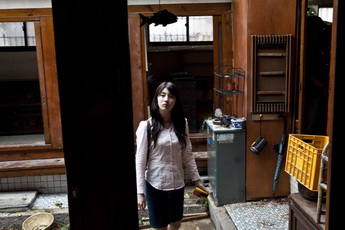 By the way, this title is not a metaphor. The film's leads, the music student Seo-yeon (Suzi) and the would-be architect Seung-min (Lee Je-hoon, Bleak Night), meet while taking an introduction to architecture course. Their romance begins with the first lecture and ends with the last one. Fifteen years later, now aged into thirtysomethings (played by Han Ga-in and Uhm Tae-woong), they meet again as an architect and his client at Jeju Island. These two narratives of their relationship unfold in a parallel structure that traverses fifteen years, in a somewhat leisurely pace.
By the way, this title is not a metaphor. The film's leads, the music student Seo-yeon (Suzi) and the would-be architect Seung-min (Lee Je-hoon, Bleak Night), meet while taking an introduction to architecture course. Their romance begins with the first lecture and ends with the last one. Fifteen years later, now aged into thirtysomethings (played by Han Ga-in and Uhm Tae-woong), they meet again as an architect and his client at Jeju Island. These two narratives of their relationship unfold in a parallel structure that traverses fifteen years, in a somewhat leisurely pace.
The subject matter is nothing new; first love, experienced by two college kids, and the bittersweet revisiting of that ephemeral experience by the same couple in their thirties. All that you could imagine and expect from such a story is brought out on a platter.
What keeps this film apart from the norm is that all these familiar elements are presented through a filter called architecture. By architecture, we do not just mean building a house, but also a whole series of factors including geographical suitability and cultural meaning of space that need to be taken into consideration. Seo-yeon and Seung-min's romance faithfully follows the curricular design of the introduction to architecture course, culminating in the actual project of building her house fifteen years later. This process is what renders the film unique: through it, the filmmakers manage to generate new meanings out of an old, almost hoary story, while maintaining a strong sense of thematic unity.
Perhaps I am taking the bait that director Lee Yong-ju (Possessed) has thrown at the viewers, but I must comment that his film's structure is in fact reminiscent of an architectural design. The stories of the lead couple do not flow like water, but are piled up on one another like bricks. This structure constitutes the film's main charm and originality, but it does not necessarily work to its advantage all the time. Sometimes, psychological portraits of the protagonists feel artificially constrained or curtailed by Lee's exacting directorial calculation. This is especially true in the case of the way the story of the couple in '90s is handled. The '90s was simply not such a long time ago for the director to convince us with the impression that things were really different then. In this and other cases, Lee's authorial design shows a tendency to advance on its own, leaving the characters behind.
Architecture 101 is also different from other films of its type in that the stories set in adult years do not dominate the college-era romance. In fact, the reverse is true here, as the open end of the young couple's story is sutured through the continuation of their story into the adult years, thankfully with nary a drop of exaggerated, melodramatic tears shed. How pleasant to watch a motion picture that ends exactly where it should.
As for the actors, the film's weight seems to tilt toward the Lee Je-hoon/Suzi couple than the Uhm Tae-woong/Han Ga-in couple (especially Lee, who is the film's de facto protagonist) but overall their characterizations are well balanced. Suzi admirably approximates a living embodiment of the It-Girl in a typical Korean male adolescent fantasy. Uhm is appropriately nonchalant and cynical, while Han is forthright yet sensitive. Despite the lack of physical resemblance among the younger and older actors, you are persuaded to believe that these youngsters would grow up into those professionals weathered by life.
Above, I did take Architecture 101 to task for playing a nostalgia game with the '90s. Some might think that I am too harsh in that regard. For me, it's tough to view that decade filtered through the haze of nostalgia. I mean, we used to surf internet then! But perhaps in today's world, wherein numerous cultural signposts can help us index and catalog the "past" in a more detailed manner, nostalgic invocation of the past itself may be becoming increasingly complex and meticulous. And, who knows, this may also be changing how we depict the past in a work of popular culture.
Finally, if you want my unadulterated, unsolicited opinion, Seung-min is a real bastard. He is either very dumb and therefore does not know what an awful thing he did, or he is simply a bastard. I opt for the latter interpretation. Architecture 101 could have been a movie with an entirely different flavor, had its makers decided to decenter Seung-min's character from his privileged position. That might have been interesting, too. (Djuna, translated by Kyu Hyun Kim)
"Anne, your behavior is not normal!" scolds Professor Park (Yoon Yeo-jung, HaHaHa) in Hong Sangsoo's 13th film, In Another Country. The Anne she is scolding is the last of 3 Annes all played by one of world cinema's greatest actresses, Isabelle Huppert (The Piano Teacher, Amour). Huppert is known for taking on roles demanding abnormal behavior. As Mick LaSalle describes in his book The Beauty of the Real: What Hollywood Can Learn from French Actresses, Huppert theatrically engages in "studies in perversity, . . . playing women of monumental strangeness, coldness, and selfishness."
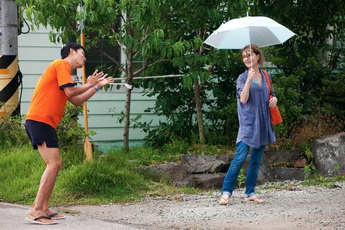 Each Anne of In Another Country is indeed strange. The Huppert/Anne triptych begins with an Anne who is a French film director visiting a fellow South Korean director, Jong-soo (Kwon Hae-Hyo, the only character along with Huppert who has not been in a previous Hong film). Anne and Jong-soo may or may not have had a fling, which is why Jong-soo's wife, Geum-hee (Moon So-ri, Like You Know It All, HaHaHa), has insisted in tagging along with them to Mohang in spite of her being what looks like 8 months pregnant. Anne then morphs into the wife of an auto executive staying in Mohang to meet her lover, film director Soo (Moon Sung-keon, A Virgin Stripped Bare By Her Bachelors, Woman on the Beach, Oki's Movie). This little rendezvous goes anything but smoothly, providing another classic Hongian drinking scene to add to Hong's cinematic bar tab. The third and final Anne transforms into a woman whose husband has left her for one of his young employees. While in Mohang, she travels with Professor Park and eventually has dinner with Jong-soo and Geum-hee. The next morning Jong-soo tries to steal kisses from her. In this way, In Another Country has Anne begin as the object of a philanderer, then she moves into the role of a philanderer herself, then to the jilted party, and finally back to being the muse of someone's less than artful philandering ways. The film is loosely structured as the screenplay of a hotel manager (Jeong Yu-mi, Like You Know It All, Lost in the Mountains, Oki's Movie). Swimming in and out of the stories is the handsome, chisel-chested lifeguard Yu Jun-sang (Like You Know It All, HaHaHa, The Day He Arrives) with whom each Anne ambivalently ponders a brief romance.
Each Anne of In Another Country is indeed strange. The Huppert/Anne triptych begins with an Anne who is a French film director visiting a fellow South Korean director, Jong-soo (Kwon Hae-Hyo, the only character along with Huppert who has not been in a previous Hong film). Anne and Jong-soo may or may not have had a fling, which is why Jong-soo's wife, Geum-hee (Moon So-ri, Like You Know It All, HaHaHa), has insisted in tagging along with them to Mohang in spite of her being what looks like 8 months pregnant. Anne then morphs into the wife of an auto executive staying in Mohang to meet her lover, film director Soo (Moon Sung-keon, A Virgin Stripped Bare By Her Bachelors, Woman on the Beach, Oki's Movie). This little rendezvous goes anything but smoothly, providing another classic Hongian drinking scene to add to Hong's cinematic bar tab. The third and final Anne transforms into a woman whose husband has left her for one of his young employees. While in Mohang, she travels with Professor Park and eventually has dinner with Jong-soo and Geum-hee. The next morning Jong-soo tries to steal kisses from her. In this way, In Another Country has Anne begin as the object of a philanderer, then she moves into the role of a philanderer herself, then to the jilted party, and finally back to being the muse of someone's less than artful philandering ways. The film is loosely structured as the screenplay of a hotel manager (Jeong Yu-mi, Like You Know It All, Lost in the Mountains, Oki's Movie). Swimming in and out of the stories is the handsome, chisel-chested lifeguard Yu Jun-sang (Like You Know It All, HaHaHa, The Day He Arrives) with whom each Anne ambivalently ponders a brief romance.
The behaviors, mannerisms, dreaming, and dialogue throughout the three plays of Anne do not hold solid ground. Present throughout In Another Country are the ambivalent actions we expect from Hong's characters. The second Anne's abrupt response when Soo finds his masculinity threatened is the highlight of the film to me. Her response is unexpected unless you're a regular Hong filmgoer and know to expect the unexpected along with the repetition. These Annes ebb and flow away from making sense like the ocean along the Mohang beaches. We are unable to anchor ourselves to an expected linear narrative within the frame, searching for our own way to some kind of narrative landmark, like each Anne seeks the lighthouse. Yet we never obtain a solid understanding of the story except maybe as the film ruminates in our heads like a dream, for it is in one of the Annes' dreams that she finally finds this lighthouse, this something 'special' the hotel manager keeps speaking of to each Anne as something she will show them. Hong on the other hand, refuses to show us the lighthouse except within a dream.
The dislocation caused by this refusal to allow viewers to ground themselves within the narrative is enhanced by the confusion caused by having three different Annes being played by Huppert. As a result, we cannot mark the three separate characters visually except for the fact they each wear different colored dresses. The other returning characters who are allowed to stay in the same roles treat each Anne anew, even though they might behave similarly to each Anne - the lifeguard will 'Pro-tect You!'; the hotel manager will show Anne something special on her way to shop, Jung-soo will hit on anything in a skirt, etc. The dialogue also allows for little stability in its fragile meaning just like the same Huppert-ed Annes and the Escher-ing narrative. Hong's ongoing study of language has always detached the words from solid signs of truths. Here, Hongian cinematic linguistics are enhanced by so much dialogue taking place in a second language (English) of which each character has limited proficiency. Anne and the lifeguard's back and forth about the lighthouse is a Who's-on-first? of very basic English language skills. Characters claim to understand each other but send conflicting signals. And it's just not mis-communication in words, but in emotion and action. The first Anne seems sexually interested in the lifeguard but dismisses him later, only to eventually write him what is possibly a love letter, but we will never truly know because the lifeguard can't read the note written in English. The lifeguard's exasperation that closes each triptych is one of those subtly powerful bits of adjusted repetition, here again around the Hongian theme of love's failed fulfillment, that keeps me coming back to Hong.
Hong has been treated well by the French. He's been nominated for both the Palme d'Or and Un Certain Regard awards at Cannes, winning the latter for HaHaHa in 2010. He filmed Night and Day in France and now he has included Isabelle Huppert here. It is truly a joy to see a French veteran actress play alongside her South Korean contemporary, Yoon Yeo-jung. As much as the song remains the same in Hong's work, just like my favorite recording artist, In Another Country keeps me faithful to following Hong's less than faithful characters. (Adam Hartzell)
Little did I know that I was going to care about table tennis at the London 2012 Olympics. But I was in Japan visiting family during the Olympics and the only Olympian from my wife's hometown of Yamaguchi City, Japan was Ishikawa Kasumi, who ended up winning a silver medal along with her fellow countrywomen in the women's team event. I ended up watching more table tennis than I ever have before. As a result, 2012 appeared to be serving up table tennis' cinematic tipping point for me. I caught Hugh Hartford's documentary on senior table tennis players while it was bouncing around the festival circuit. With my interest piqued, I have been noticing a few films in production related to table tennis, such as Sarah Newens and Mina T. Son's Top Spin which is scheduled for a 2013 release.
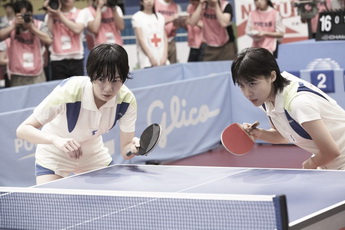 This new found interest propelled me forward to actively seek out Moon Hyun-sung's table tennis drama As One (the film's Korean title is simply 'Korea'), based on South Korea's own real-life variation of ping-pong diplomacy. The original ping-pong diplomacy was between the U.S. and China in 1971, enabling an opening up of long dormant relationships between the two countries. As Victor D. Cha details in his book Beyond The Final Score: The Politics of Sports in Asia, there was much going on behind the scenes prior to the U.S. table tennis team touring China, but the actual tour enabled an opportunity to gauge whether the public, on both sides, was ready for a thawing of Sino-American relations. South Korea had engaged in its own political gamesmanship with the Soviet Union in the lead up to the Seoul Olympics in 1988 and with a similar strategy towards China before the 1986 Asian Games in Seoul and the 1990 Asian Games in Beijing.
This new found interest propelled me forward to actively seek out Moon Hyun-sung's table tennis drama As One (the film's Korean title is simply 'Korea'), based on South Korea's own real-life variation of ping-pong diplomacy. The original ping-pong diplomacy was between the U.S. and China in 1971, enabling an opening up of long dormant relationships between the two countries. As Victor D. Cha details in his book Beyond The Final Score: The Politics of Sports in Asia, there was much going on behind the scenes prior to the U.S. table tennis team touring China, but the actual tour enabled an opportunity to gauge whether the public, on both sides, was ready for a thawing of Sino-American relations. South Korea had engaged in its own political gamesmanship with the Soviet Union in the lead up to the Seoul Olympics in 1988 and with a similar strategy towards China before the 1986 Asian Games in Seoul and the 1990 Asian Games in Beijing.
As for sports diplomacy towards North Korea, it goes without saying that South Korea has always had a trickier time with its northern neighbor. When it was announced Seoul had been awarded the 1988 Olympics, Kim Il-sung eventually proposed North Korea co-host the Olympics, even though North Korea had never bid for any Olympic games before. In negotiations with the International Olympic Committee, South Korea did offer a few events for the North, but the North wanted way more than was feasible, first asking for half the events and then asking for a third of them. In the end, North Korea failed to convince the IOC of their right to any events. Three months after that decision was made, two North Korean spies planted a bomb on Korean Air Flight 858 during a layover at Abu Dhabi, a bomb that detonated while the flight was heading to Bangkok, an act of state-sponsored terrorism that reports say was partly intended to discourage international teams from attending the 1988 Olympics. This is the politically fraught background that contextualizes As One, based on a true story that took place in 1991.
One of the 1988 Olympic events initially offered to North Korea as a peace offering was table tennis, a North Korean favorite. (It seems to be a trope or stereotype that South Korean films about North Koreans include table tennis references. I'm thinking of films like The Journals of Musan and Dance Town.) One month before the 1991 World Table Tennis Championships in Chiba, Japan, a decision was made by respective North and South Korean governments to form a unified team to compete at the WTTC. The 'ideational space' of such a sport-meets-politics decision is the focus of As One. Tensions build between who will be selected to eventually compete and how well the competitors perform with the added stress of the peninsular politics. Along the way, athletes across a significant political divide get to know each other by working towards a common goal of sporting success, along with the everyday interaction a team focus provides.
The table tennis on dramatic display here is quite impressive, as are the overall performances by the two leads, Ha Ji-won (Ditto, Phone, Duelist) who plays Hyun Jung-hwa, and the great Bae Doo-na (Take Care of My Cat, The Host, and most recently, the U.S. feature Cloud Atlas) who plays Lee Boon-hee. Bae in particular presents the un-glamorous character type which has brought her praise on the festival circuit, here adding a physical vulnerability that layers suspense upon her character's prospects, at least for those viewers, like myself, who watch unaware of how this real-life story pans out.
The most striking aspect of As One for me is what I'm going to call the 'Choco-Pie Moment'. This is a reference to the great scene in JSA: Joint Security Area where Song Kang-ho's character, a North Korean soldier, spits out the Choco Pie he is eating, and thoroughly enjoying, when Lee Byung-heon's character suggests he defect to South Korea where he can eat more Choco Pie's. As One's Choco Pie Moment is less 'patriotic' and dramatic, but all the more striking for its mundane nature. When Boon-hee responds to Jung-hwa's suggestion that Boon-hee defect, Boon-hee's response is not reactionary, but an expression of sincere disappointment at Jung-hwa's arrogance that causes Jung-hwa to be so clueless to what Boon-hee's home means to Boon-hee. Jung-hwa does come around to understand the constraints of her friendship with Boon-hee and As One becomes, if you let it, a sports drama that knows how to pull the heart strings.
In the end, As One is not up there amongst the greatest sports dramas ever. (My fave is still the classic hockey film from 1977, Slapshot.) But As One is entertaining enough while providing another opportunity to investigate the evolving North Korean Other in South Korean cinema. (Adam Hartzell)
Two Weddings and a Funeral is director Kim Jho Gwangsoo's first full-length feature, a romantic comedy about a gay man, Min-soo (Kim Dong-Yoon in his feature film debut), and a lesbian, Hyo-jin (Ryoo Hyoun-Kyoung - Cyrano Agency, Petty Romance), who marry each other to enable access to privileges kept from them because of the demands in their own families and the laws in South Korea. Min-soo wants the home his parents have offered as a reward for consummation of heterosexual norms. Hyo-jin wants to adopt a child, something not available to lesbian couples in South Korea. Along with working together at the same hospital where both are doctors, they live across the hall from each other in an apartment complex, Hyo-jin living with her partner Seo-young (Jeong Ae-Yeon - When I Turned Nine, More Than Blue). Min-soo has a queer posse, fellow gay men of various expressions of gender and they often meet at a gay bar owned by one of his friends. Soon after his wedding, Min-soo passes the man of his dreams on a staircase, Suk (Song Yong-Jin), whom he quickly discovers has begun working at his friend's bar. With his affections directed outside his facade of a marriage, with his mother in the habit of dropping by unannounced, and with his hospital colleagues passively fueling homophobic rumor mills, Min-soo and Hyo-jin's charade is vulnerable to being exposed.
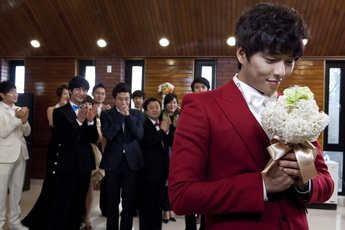 Two Weddings and a Funeral is of the romantic comedy genre where some equally serious social issues get addressed. Things are getting better for queer folk in many countries thanks to the work of Gay Rights movements making sexual diversity, to use Wesley Morris' wonderful phrase in his Grantland article on lesbian WNBA star Brittney Griner, an "utterly 'whatever'" shrug of a reality for the Millennial generation. But there are still a great many barriers to be brought down in many countries to allow queer lives to truly flourish. As much as Seoul just held its 14th LGBT Pride Festival this summer of 2013, the lives of most queer Koreans still require navigation around demands to save face for the family and efforts to perpetrate as if one were straight. Such demands of the heterosexual hegemony is what sets up the tension surrounding this fake marriage, tension that is often released through humor, but occasionally through tears. In watching a film that works off fake marriage between a gay man and a lesbian, we need to keep in mind that the parties are not totally at fault for the subterfuge because the society they live in does not allow them many alternatives. Society and the family demand that they live a lie. Outside the film Two Weddings and a Funeral, director Kim does not want to live this lie. He plans to marry his long-time partner Dave Kim this summer (2013). They plan to marry because they love each other. But they also plan to test the discriminatory laws when, as is expected, their marriage certificate will be denied.
Two Weddings and a Funeral is of the romantic comedy genre where some equally serious social issues get addressed. Things are getting better for queer folk in many countries thanks to the work of Gay Rights movements making sexual diversity, to use Wesley Morris' wonderful phrase in his Grantland article on lesbian WNBA star Brittney Griner, an "utterly 'whatever'" shrug of a reality for the Millennial generation. But there are still a great many barriers to be brought down in many countries to allow queer lives to truly flourish. As much as Seoul just held its 14th LGBT Pride Festival this summer of 2013, the lives of most queer Koreans still require navigation around demands to save face for the family and efforts to perpetrate as if one were straight. Such demands of the heterosexual hegemony is what sets up the tension surrounding this fake marriage, tension that is often released through humor, but occasionally through tears. In watching a film that works off fake marriage between a gay man and a lesbian, we need to keep in mind that the parties are not totally at fault for the subterfuge because the society they live in does not allow them many alternatives. Society and the family demand that they live a lie. Outside the film Two Weddings and a Funeral, director Kim does not want to live this lie. He plans to marry his long-time partner Dave Kim this summer (2013). They plan to marry because they love each other. But they also plan to test the discriminatory laws when, as is expected, their marriage certificate will be denied.
Besides the obvious benefits such identity-based cinema provides, there are other aspects of this funny and dreamy rom-com that make it an engaging film. Min-soo's boyfriend Suk is a Korean-American. As a result, he serves as a buffer to Min-soo's belief that they can only find their desires fulfilled if they, in the words of The Village People, 'Go West!'. Min-soo envisions Paris as their place of freedom, but Suk, as an American who has come back to South Korea, provides a counter-point that 'escaping' might not be the answer. Suk is 'escaping' his family's homophobia back in the U.S., but his family still returns to South Korea to remind him his kind isn't wanted. Suk knows you have to improve things for yourself and your queer brothers and sisters where you are, because what you escape will always come back to you.
And speaking of sisters, what's nice about this 'gay (men's) film' is that a fairly fleshed-out lesbian is included. Yes, Hyo-jin isn't at all the primary focus, but she isn't an afterthought either. In fact, Min-soo's making her an afterthought in his life is well-critiqued within the film. Min-soo's selfishness results in him not only forgetting that Hyo-jin has a plight similar to his regarding sexual diversity, but also that she doesn't possess the male privileges he has to deflect the rumors about her sexuality at the hospital. A Lesbian Cinema has been clearly lacking in South Korea. (I know of no out lesbian feature film directors. As for films, there's A Bizarre Love Triangle, sure, but Momento Mori can be seen by many as 'situational sexuality' rather than a confident lesbian identity.) Kim's efforts to place a lesbian character alongside Min-soo here is contributing to an emerging Korean Queer Cinema by at least attempting to consider lesbian lives along with the gang of gay men.
In researching for this review, I only recently became aware that Kim was a producer of one of my favorite South Korean films, Wanee and Junah, one of the most 'queer' films made in South Korea without directing the focus on a gay or lesbian couple. (See my piece on that film for further explication of that argument in the upcoming Directory of World Cinema: South Korea edited by Colette Balmain.) Now it only makes sense that Kim, the second openly gay South Korean feature film director, (the first being Leesong Hee-il), would be seeking to advance Korean Queer Cinema in the way he has here with Two Weddings and a Funeral. (Adam Hartzell)
Han Dae-hee is a seventh-grade civil servant, and he has it all. A predictable work schedule, a comfortable salary, respect at the office for his advanced PowerPoint skills and seemingly endless knowledge of random facts. In contrast to his coworkers, who get worked up over citizens' unreasonable demands and complaints, Dae-hee is eternally cool and unruffled. That's the secret to success for a civil servant, he says: to never become the victim of one's own excitement. Each night, settling into bed at an early hour, he comforts himself with the thought that he has the best job in the world.
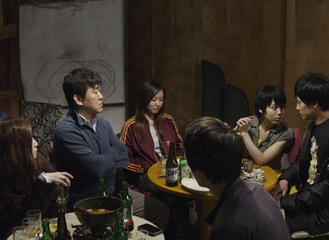 But complications lie ahead. He works in the Mapo-gu office, and his district encompasses the hub of the Korean indie music scene, Hongdae. One day he oversees the eviction of a struggling indie band from their rented room, and a series of unexpected events leads to the band taking up residence in Dae-hee's basement. Dae-hee doesn't particularly like music, and the cultural gap between the impulsive young bandmembers and the preternaturally steady Dae-hee couldn't be greater. A conflict of some sort seems inevitable, which begs the question: will Dae-hee be able to resist becoming "dangerously excited?"
But complications lie ahead. He works in the Mapo-gu office, and his district encompasses the hub of the Korean indie music scene, Hongdae. One day he oversees the eviction of a struggling indie band from their rented room, and a series of unexpected events leads to the band taking up residence in Dae-hee's basement. Dae-hee doesn't particularly like music, and the cultural gap between the impulsive young bandmembers and the preternaturally steady Dae-hee couldn't be greater. A conflict of some sort seems inevitable, which begs the question: will Dae-hee be able to resist becoming "dangerously excited?"
This wry, funny story from director Koo Ja-hong (The Wolf Returns) is one of those unexpected pleasures: a film that is able to take a very ordinary situation, and turn it into something vivid, memorable and thoroughly entertaining. Dae-hee doesn't seem at first glance to be the kind of character who can grab our sympathies, but he's so well drawn and so well acted that we inevitably surrender. Although Dangerously Excited does contain some laugh out loud moments, much of the humor comes at us from an angle, and is just as funny when you think about it a day later as when you're sitting in the theater. The film is neither structured nor styled like a comedy, but it's still hilarious.
The former theater actor Yoon Jae-moon will be recognizable to many fans of Korean cinema for his supporting roles in Mother, The Good, the Bad, the Weird, A Dirty Carnival, and many other recent films. He's got that rare ability to light up the screen whenever he appears, and so it's a particular treat to have him front and center for this entire film. His naturally wry demeanor makes him the perfect fit for the self-satisfied and smug character of Dae-hee. It's also both to the actor's and director's credit that the arc taken by his character never feels forced or unrealistic. In the end, this is one of the most memorable screen performances of 2012, and one hopes that the film's modest budget and lack of star power won't prevent it from reaching the widest possible audience. (Darcy Paquet)
In-jung (Park Jin-joo, Sunny), a high school student, Seok-ho (Kim Ji-seok, TV series The Slave Hunters), a young writer, and So-hee (Park Han-byeol, Wishing Stairs, Yoga School), a news-anchor-like beauty, find themselves waking up in a strange, isolated house, without any memory of how they got there. Worse, they are unable to leave the house and its vicinity. The forest seems to be haunted by what appears to be ghosts of hanged-by-neck murder (suicide?) victims. And there are two moons floating in the pitch-black night sky...
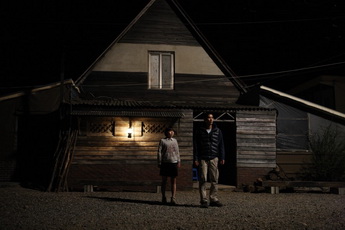 There are many types of horror cinema. Some are best catered to the cognoscenti, not easily shocked or offended by an outré subject matter or extremist style but craving for a sense of wonder or challenge that pushes the genre's envelope: others would be better appreciated by those equally well-versed in the vocabularies and grammars of the genre but are less demanding and willing to take comfort in familiar thrills, nonetheless (hopefully) executed with gusto and competence.
There are many types of horror cinema. Some are best catered to the cognoscenti, not easily shocked or offended by an outré subject matter or extremist style but craving for a sense of wonder or challenge that pushes the genre's envelope: others would be better appreciated by those equally well-versed in the vocabularies and grammars of the genre but are less demanding and willing to take comfort in familiar thrills, nonetheless (hopefully) executed with gusto and competence.
Two Moons belongs to the second category. The premise itself is an over-used clich?: you don't have to go back to the classic Twilight Zone episode, in which a soldier, a ballerina, a clown and other assorted characters try desperately to escape what appears to be a chimney-like white limbo, to find numerous tales of fright that stash a limited group of characters in a variety of claustrophobic settings, trying to put together the reasons for their predicament. And how many explanations of their dilemmas can you come up with anyway? Are they subjects of a sinister government experiment or stars of a snuff-reality TV program? Are they dead spirits stuck in the purgatory? Have they been abducted by space aliens who are rubbing their tentacles in a gleeful anticipation of probing their, um, certain anatomical regions? We have seen all these and more before (And few of them frankly coming even close to the level of ballsy surrealism of the aforementioned TZ episode made fifty years ago). Still, scribe Lee Jong-ho (Yoga School, Bunshinsaba) and director Kim Dong-bin (the rather underrated Red Eye and The Ring Virus, which also has its defenders) manage to draw the viewers into the narrative for a while, aided by some compelling performance from the leads, especially Park Jin-joo, whose spunky but easily scared personality adds much humanity to the proceedings.
Had the film been more ambitious and tried to transcend its own clichés, in the way, say, Cabin in the Woods does successfully, or at the very least to actualize in cinematic terms the alien dimension (the one with the alternative moon, that is) that the characters find themselves in, it could have been a memorable experience. Unfortunately, such possibilities are only tantalizingly glimpsed in the final product. From the two-thirds point of the story, one of the characters suddenly takes on a heroic role (Considering Bunshinsaba and this film, I am guessing this incorporation of another sub-genre is the screenwriter Lee's contribution), and what transpires after this change is a lot louder but less emotionally engaging (The attempt to replicate the "spider-walking Regan" sequence from The Exorcist on a bargain-basement budget should have been at least amusing, but as presented, comes off as borderline ludicrous), culminating in another fashionably morose conclusion that leaves the characters stranded in an existential loop.
Two Moons is not exactly a terrible film but, like its increasingly annoyed and annoying lead characters, is ultimately unable to break out of the confines of its own (limited) imagination. While likely to moderately please most horror fans, the film is just too unadventurous to be remembered for the long haul. (Kyu Hyun Kim)
'Tis the summer season again, and of course no Korean summer can do without a horror film. The Puchon Fantastic Film Festival, unlike earlier days, now invites domestic horror products geared for summer releases (along with a host of more independently-minded genre productions), and selected Horror Stories, a quasi-prestigious omnibus horror, as its opening film. It was released to theaters in late July, to a rather lukewarm box office response.
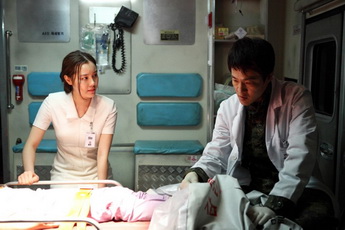 Put together by Soo Film, which was behind Min Kyu-dong's recent works (All About My Wife, All For Love, etc.), Horror Stories is one of those Korean genre films sophisticated in conception and earnest in intent but not quite as memorable as it should have been. All of the stories are technically well-made, and certainly cannot be accused of dialing down the booga-booga factor, but none of them are entirely satisfactory, lacking genuine spiritual perversity or unabashed dynamism of a truly great horror film. They all feel like model students impersonating thugs or geeks, almost convincing us but not quite.
Put together by Soo Film, which was behind Min Kyu-dong's recent works (All About My Wife, All For Love, etc.), Horror Stories is one of those Korean genre films sophisticated in conception and earnest in intent but not quite as memorable as it should have been. All of the stories are technically well-made, and certainly cannot be accused of dialing down the booga-booga factor, but none of them are entirely satisfactory, lacking genuine spiritual perversity or unabashed dynamism of a truly great horror film. They all feel like model students impersonating thugs or geeks, almost convincing us but not quite.
Min Kyu-dong directed the wrap-around sequences that "introduce" each segment, in which a stunningly beautiful high school student (Kim Ji-won) is menaced by a serial killer with speech impediment (Yoo Yeon-seok) and forced to tell, Scheherazade-like, "scary stories" that will keep him at bay for the night. These sequences typically reveal one big problem with Horror Stories: while they are skillfully directed, persuasively performed and competently designed, they really have no proper resolution. The narrative simply ends at the point where the viewers sit forward in their chairs and wonder, "Okay, so what happens next?"
This type of non-ending and lack of basic ideas mar the second episode, "The Terror Plane," directed by Yim Dae-woong, whose To Sir With Love (a.k.a. Bloody Reunion) showed an interesting proclivity toward the giallo-like, overripe stylistics. Setting aside believability of the premise that a domestic Korean flight could so easily fall under the control of a single psychopath, Yim has little new to offer other than a standard slasher-film cat-and-mouse chase. This segment, by the way, confirms my long-held prejudice that Korean cinema (unless it relies on foreign sources, such as Japanese novels) does an exceptionally poor job of depicting psychopathology or a cold, unfeeling evil (Holy beetle-dung, don't bring up I Saw The Devil, please!).
A good number of Korean viewers seem to nominate as the scariest the first episode "The Sun and the Moon," helmed by Jeong Beom-shik, one-half of Jeong Brothers behind the exquisite Epitaph. It is actually based on a Korean folk tale about a tiger who, a la The Big Bad Wolf, gobbles up and impersonates the mother of a young boy and his sister. Jeong is one Korean director who really knows how to scare the audience (who could forget the blood-drenched mother "singing" a lullaby that sounds like a hundred rats gnawing on piano strings to her terrified daughter in Epitaph?) so the positive audience response is not surprising. Unfortunately, Jeong turns his grim fairy-tale at the two-thirds point into a heavy-handed political allegory, complete with a narration that earnestly announces to the viewers that "we are now entering the world of documentary realism (Really!)." Even though Jeong's agenda is obviously more complex than simply punishing the greedy corporate managers via supernatural retaliation, in the end, the episode's "open" resolution-- and the implied savagery against children by a supposedly "sympathetic" character-- leaves a bad aftertaste.
Even though it is rather clunky in execution, I am willing to defend the honor of the third short, "Kongjwi and Patjwi," another adaption of a well-known folk-tale, and another variant of Cinderella, with an emphasis on the colorful villainy of the stepmother and the "ugly" stepsister Director Hong Ji-young (The Naked Kitchen) is openly uninterested in realism and keeps the story unfolding in a totally manufactured space, adorned with deliberately kitschy, retro decors and decked with a grungily homespun operating room-cum-abattoir. While no match for Fruit Chan's skills in evoking terror and sympathy for his doomed characters in the similarly-themed Dumplings (2004), Hong injects slyly subversive humor to the proceedings (See, for instance, how the eyeball-looking-through-the-hole-in-the-wall gag from Psycho is treated here as opposed to in "The Terror Plane"), keeping it enjoyable if not particularly frightening. I only wish Jeong Eun-chae (playing Kong-jwi, reinterpreted here as an obnoxious princess) and Bae Soo-bin as the Bluebeard stand-in were more adept at essaying their (admittedly broadly conceived) roles. As it stands, the short sort of resembles a TV drama pilot that got rejected not because it was too scary but too wacky. Which I suppose is not such a bad thing after all.
The final episode, Kim Gok and Kim Sun's "The Ambulance," is a suspenseful tale of a doctor, a nurse, an unconscious child and her mother in an ambulance escaping at full speed from a horde of berserker zombies. The military doctor (Jo Han-cheol) believes that the child was infected by a zombie epidemic, and the tension and anxiety level begins to climb as the nurse (Kim Ye-won) must make a choice between following his orders and helping the child's distraught mother (Kim Ji-young). In terms of the sheer terror quotient, "The Ambulance" is probably the most effective among the four, with Kims, whose White: A Deadly Melody was allegedly butchered into the currently available, hideous mess by the nervous studio executives, winning back much respect from the genre fans with their tightly controlled direction and editing that maximizes tension in a claustrophobic setting. The short is so well made that its "downbeat" ending, which you can predict from a mile away, is more disappointing than it should have been. Nonetheless, the Kim Brothers' contribution is the only one in Horror Stories that I would like to see expanded into a feature film.
Overall, the omnibus film can be chalked up as a positive contribution to expansion of the perimeter of Korean horror. I have two specific pieces of advice for anyone who wants to attempt something similar in the future. Number one, let's try to bring a proper ending to a story, if possible. "Ambiguous" and "open" endings do not necessarily make your movies more evocative or thoughtful. They do so only when they are done well, which is rarer than one imagines. Number two, you are all very skilled directors, but your ideas are not very interesting, folks. I understand that it is not easy coming up with an original take on any horror-related subject, but I just have this suspicion that you are treating horror as a kind of baseline skill-set, not something that requires all components of your brain roaring at the maximum capacity. I hope you appreciate that making a great zombie movie like Day of the Dead (the George Romero original) or Deathdream is many times more difficult than making a great romantic comedy or a great left-wing political thriller.
I hope I am wrong about this assumption, and I hope I get to see in the near future a horror omnibus film from Korea that surpasses Spirits of the Dead (directed by Roger Vadim, Louis Malle and Federico Fellini. based on stories by Edgar Allan Poe: how's that for a horror film lineup?) in quality. (Kyu Hyun Kim)
Choi Dong-hoon of Woochi, The Big Swindle and Tazza: The High Rollers returns to his specialty, a caper film, (his production company is now named Caper Films, natch) more ambitious in scope and technology than his previous works, with a hybrid cast including not only his regulars and reliable Korean supporting players but also Hong Kong stars. The resulting crime thriller has become the biggest hit of 2012 so far, raking in more than 10 million tickets by mid-August and easily outdistancing The Dark Knight Rises at the box office.
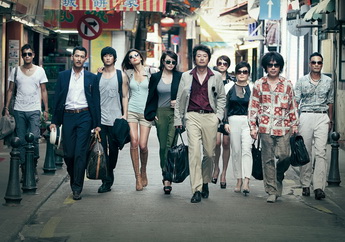 The runaway hit status of The Thieves is sure to please the film's financiers and media pundits, but critics and journalists seem to disagree among themselves about why it has been so popular. So far much of the media discussion has centered around the so-called "comeback" of Jeon Ji-hyun a.k.a. Gianna Jun, the My Sassy Girl herself, who finally landed a meaty role as the rope-climbing cat burglar Yenicall (Just a note: Lee Jeong-jae's character is nicknamed "Popeye" but in the film's pointlessly English-appended main title it is spelled "Popie." I suppose this could be like a fake Gucci bag with a brand deliberately spelled "Gutchi."), but some reviewers expressed perplexity at the fact that Korean viewers, notorious for their picky tastes, simply swallowed the movie en masse despite its somewhat loose narrative structure and overly sentimental touches. Others appear to find a certain air of corporate anonymity that seems to waft throughout the film troublesome, if not downright annoying.
The runaway hit status of The Thieves is sure to please the film's financiers and media pundits, but critics and journalists seem to disagree among themselves about why it has been so popular. So far much of the media discussion has centered around the so-called "comeback" of Jeon Ji-hyun a.k.a. Gianna Jun, the My Sassy Girl herself, who finally landed a meaty role as the rope-climbing cat burglar Yenicall (Just a note: Lee Jeong-jae's character is nicknamed "Popeye" but in the film's pointlessly English-appended main title it is spelled "Popie." I suppose this could be like a fake Gucci bag with a brand deliberately spelled "Gutchi."), but some reviewers expressed perplexity at the fact that Korean viewers, notorious for their picky tastes, simply swallowed the movie en masse despite its somewhat loose narrative structure and overly sentimental touches. Others appear to find a certain air of corporate anonymity that seems to waft throughout the film troublesome, if not downright annoying.
All of these criticisms are legitimate, although they do not really diminish the pleasure you get out of watching Choi nimbly wrangling the talented ensemble cast and the convoluted plot like a master conductor. There is a lot to love in this smart and smooth motion picture. The level of artistry, beginning with versatile cinematography supervised by DP Choi Young-hwan (Tazza, Take Care of My Cat) and Lighting Director Kim Seong-gwan (Bestseller), colorful production design by Lee Ha-joon (Shadows in the Palace, The Housemaid) and editing by Shin Min-kyung (Villain and Widow, Blind) is top-notch. The dialogue is, as usual in a Choi Dong-hoon film, vibrant and witty, if a tad sophomoric.
For a movie with more than ten major characters with their own complex back-stories, and given that quite a few of them are acting in foreign tongues for the most part, almost no actor or actress gets lost in the shuffle. Kim Yun-seok, always in control, and Kim Hye-soo, radiantly beautiful, are given the roles that provide the film's emotional core, so they come off best. Jeon has never been a bad actress and she acquits herself well here, although I still don't get why most Korean men go ga-ga over her (and Lee Hyo-ri, for that matter. I am not denying that these women are gorgeous beauties, just in case). Interestingly, Simon Yam and Angelica Lee are given characters that seem to be purposefully conventional, a throwback to a borderline-campy '80s Hong Kong actioner, and consequently are not as memorable as they ought to be. (One of Choi's few missteps was forcing Yam to say much of his lines in horrendous Japanese... he is supposedly impersonating a Japanese tourist!) Despite its globe-hopping narrative, the film never loses its viewers' attention and generates a good deal of suspense in the latter half, in which the perfectly laid-out plan inevitably crashes and every member of the crew must fend for his or herself, climaxing in a thrilling rope-climbing action sequence that displays some astonishing, bone-cracking stunts.
Ultimately, though, The Thieves is retrograde. The aforementioned technical razzle-dazzle notwithstanding, The Thieves has the look and feel of an old TV episode-- from American shows like It Takes A Thief or Mission: Impossible-- cannily polished and updated for the domestic theatrical market, with doses of "uncool" melodrama and even nostalgia for gun-blasting '80s Hong Kong "noir." Again, there is nothing fundamentally wrong with this, but I cannot help feel that many years down the lane The Thieves may be more meaningful as a canny indicator of the significant shift in the demographic and tastes of the Korean movie-going public than as an attempt to create a truly original crime thriller rooted in Korean history and culture, like Tazza. It might have helped for me if Macao Park's (Kim Yun-seok) character was a bit dirtier, or conversely a bit nobler, than he was in the film. While I still greatly enjoyed the film, in the end I missed the unconscionable but oddly sympathetic villainy of Agwee or Officer Pyeong (Baek Yun-shik) in Tazza. (Kyu Hyun Kim)
The Neighbors is based on Gangfull's (Hello Schoolgirl, APT, 26 Years) web comic series. It tells the story of a serial killer who kidnaps and murders a victim every ten days, and how the neighbors of the killer in a multiplex housing gradually become aware of his presence among them. As is typical of Gangfull's work, its genre identity is complex, drawing from the conventions of horror, mystery and melodrama. And again as in his other comics, the author is not afraid to ground it in his strong faith in the solidarity of ordinary Korean folks.
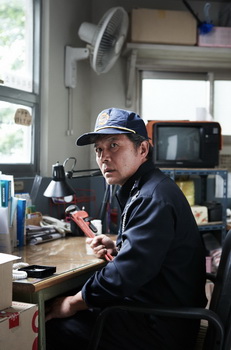 At first glance, The Neighbors appears to render itself naturally to a cinematic adaptation. It has all the right ingredients: simple but vivid characterization, an exciting and appealing story, a nice pace, and an extremely cinematic way the author chooses to plot his narrative. So far, cinematic adaptations of Gangfull's comics have never been able to make something truly special out of these ingredients. Sadly, it's déjà vu all over again with The Neighbors. One ends up leaving the theater thinking, "With a source material like this, and with this much talented cast, is this all that the filmmakers could do?"
At first glance, The Neighbors appears to render itself naturally to a cinematic adaptation. It has all the right ingredients: simple but vivid characterization, an exciting and appealing story, a nice pace, and an extremely cinematic way the author chooses to plot his narrative. So far, cinematic adaptations of Gangfull's comics have never been able to make something truly special out of these ingredients. Sadly, it's déjà vu all over again with The Neighbors. One ends up leaving the theater thinking, "With a source material like this, and with this much talented cast, is this all that the filmmakers could do?"
I do not mean to suggest the film is a turkey. It is basically a competent thriller: the plot is still quite gripping, and the brilliant cast, including Kim Yun-jin, Ma Dong-seok, Kim Sae-ron, Jang Young-nam and Cheon Ho-jin, does its professional best. Just threading their roles together according to Gangfull's original design would have been sufficient to come up with a fairly involving thriller. Yet, the film does not even complete this task satisfactorily.
The biggest problem with The Neighbors is that the multiple threads of the narrative, equitably distributed among more than ten characters, are not adequately managed by director Kim Hwi (writer of Haeundae, Midnight F.M., Over My Dead Body). There is something amiss in the way segmented episodes devoted to different characters are distributed and ordered: hence, the climactic integration of individual story threads has little rhythm and falls flat. The introductory section, that goes back and forth between past and present, is likewise miscalculated, significantly weakening the horror and pathos that it was supposed to evoke. Finally, actions of the "neighbors" themselves during the climactic crisis fail to generate the expected level of suspense. This is not just a matter of technical competence: the lack of suspense here in fact sabotages the articulation of the movie's theme, collective responsibility and solidarity of the ordinary folks, toward protection of their most vulnerable member.
Curiously, some scenes that appeared so obviously cinematic in the original cartoon lose their steam when faithfully adapted to the screen. A good example is those involving a young girl's "ghost" in the opening sequence. What was striking in the cartoon world ends up being absorbed into a typical genre mechanism. Are the ideas added to the film version any better, then? Unfortunately no. The filmmakers, for instance, revised the background information for the serial killer and the security officer characters, but the effect it has on the movie is minimal. On the other hand, the original ending's rather wild idea, worthy of Dario Argento, has been replaced by a dreadfully conventional alternative setup that simply deflates the tension.
As for the performances, they are adequate, but could have been directed to avoid some awkward expositions that sound as if directly cribbed from dialogue balloons in the original. The cast ends up mouthing more expository monologues than really necessary. Director Kim seems to have not paid sufficient attention to managing an ensemble as well as their distinctively textured performances.
The Neighbors is not as bad as APT, which tinkered with the source material and made a mess out of it. However, it is guilty of another, less obvious blunder: to lower the guard, complacent in the belief that the comic writer had done most of the job for the screenwriter and director. In my view, The Neighbors remains either too idle or too timid to be a meaningful interpretation of Gangfull's original. (Djuna, translated by Kyu Hyun Kim)
Heaped with acclaim and the Venice Film Festival's Golden Lion, Pieta supposedly marks Kim Ki-duk's return as global art film provocateur. In Pieta, which Kim has stated in interviews is "all about money," capitalism's relentless exploitation of organic life (not least of which is human) takes literal form in an insurance fraud scheme that structures the plot. A merciless enforcer, Kang-do, maims debtors who cannot repay their loans, which increase exponentially as their 1000% interest rates capitalize. The borrowers have signed bodily injury insurance policies as loan guarantees, so limbs, joints, and appendages take on monetary value that Kang-do extracts. One day, a woman claiming to be Kang-do's mother appears at his door, to pay penance for abandoning him as a child and turning him into the monster that he has become.
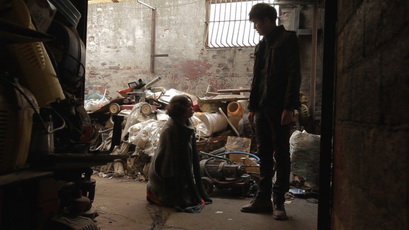 The film confines its characters to the dingy, crumbling machine shops and alleyways of the soon-to-be razed Cheonggyecheon industrial slum -- the inverted image of the recently beautified waterway that goes by the same name. Filled with industrial detritus, including the worn bodies and spirits of an impoverished working class, these spaces operate on an economy of limbs because the deteriorating workshops' heavy machinery no longer produces value through manufacturing. Kang-do puts the machines to horrific use producing bodily injury, with the dispassionate efficiency of an assembly-line worker. The laborers whose bodies bear the scars of this logic of human expenditure become beggars and outcasts, nursing their hatred of Kang-do and paradoxically transforming their injuries into life-sustaining revenge fantasies.
The film confines its characters to the dingy, crumbling machine shops and alleyways of the soon-to-be razed Cheonggyecheon industrial slum -- the inverted image of the recently beautified waterway that goes by the same name. Filled with industrial detritus, including the worn bodies and spirits of an impoverished working class, these spaces operate on an economy of limbs because the deteriorating workshops' heavy machinery no longer produces value through manufacturing. Kang-do puts the machines to horrific use producing bodily injury, with the dispassionate efficiency of an assembly-line worker. The laborers whose bodies bear the scars of this logic of human expenditure become beggars and outcasts, nursing their hatred of Kang-do and paradoxically transforming their injuries into life-sustaining revenge fantasies.
The second half of the film abruptly shifts the tone and muddies the painstaking social critique established in the first. Exploitative moneylending to the vulnerable under-class is a cliché of Korean gangster films and TV melodramas, which use the loan shark and the victim as shorthand for a Manichean moral landscape, in the process erasing the presence of the real thugs (e.g former Pres. Lee Myung-bak, Samsung Chairman Lee Kun-Hee) and systemic, macrosocial problems (institutionalized misogyny, for instance). Kim's proposition that all of this boils down to money seems a little misleading, since, to its credit, the film focuses instead on exploring this obsession with money (and the way it motivates certain actions and modes of violence) as a symptom, not a cause.
What should be patently clear to the viewer, after being put through the wringer of Kang-do's work routine, is that neither the debtors nor Kang-do himself are the source of the ills that plague post-industrial Seoul. The conditions of the impoverished laborers amply critique South Korea's nonexistent social welfare system and expose the weakness of social bonds, especially the ineffectuality of kinship as any sort of protection against marginalization. Pieta seems intent on putting an ironic spin on the ideals of filial piety or maternal devotion by making these relations utterly burdensome, going so far as to suggest that they are the root of psychotic violence and psychosexual perversion. Pieta comes close, at times, to an endorsement of sociopathy and certainly paints at least one suicide as a self-evidently justifiable act. Yep, fun times.
I confess that I only managed to get through Pieta by taking notes, so that I could immediately blunt the force of its images into unassuming, sometimes absurdist phrases: "fish bones/red fish guts on the tile" "post-masturbatory iphone picture message," "lady in sweater-poncho frees bunny." This was during my first screening of the film at PIFF 2012, where I sat scribbling in the dark onto the back of a promotional flyer. But taking notes also helped me to understand how very stylized the film is -- when I found myself writing "mother-son, staged, make-up, why not real people?"
As one recognizes the film's formalism, despite its gritty verisimilitude, Pieta's structure becomes obvious as a fable. The film seems at first to shape its indictment of systemic violence into a generic morality tale by personalizing the desperate vendettas of the underclass. But this impulse to blame Kang-do and the woman who neglected him falters, since Kang-do and the woman are as otherworldly as religious icons or the marble Mary cradling a crucified Christ in Michelangelo's renaissance masterpiece. Jo Min-soo, playing the mother, comes off in the film as a concept with a body. She is a pure incarnation of maternal suffering, with swelling rivulets of tears streaming down her face, as if she wept glycerin. Lee Jeong-jin as the remorseless debt collector Kang-do does his best to be repellent, despite his TV drama good looks and his inexplicably hipster wardrobe. These characters don't just seem out of place in the Cheonggyecheon industrial slums, they're so alien to their milieu that they may as well have dropped out of the sky as visitors from the Planet Allegory.
Pieta mashes up psychological realism and formalist experimentation, showing this combination to be the best recipe for what's become known as "extreme cinema." Though Kim hasn't usually been included in the group of Korean auteurs whose work connotes innovative genre-bending, his turn to the revenge thriller lends itself to a fruitful comparison with Bong Joon Ho's Mother (2009). Both films take up mother-son boundary problems, internal -- in the tendency to over-identify -- but especially in the social conventions that valorize such over-identification as self-sacrificing parental devotion or filial piety. Towards the other end of the genre spectrum, another related film might be Lee Chang-dong's Poetry (2010), which takes up questions of debt and kinship by focusing its critical lens on the stark differences in moral consciousness produced by generational divides.
Though Pieta's treatment of revenge as an insoluble relation of indebtedness is compelling, especially its refusal to simply validate forgiveness as the proper response to debt, I had a hard time getting past the specificity of the mother's indebtedness. For, as seriously as Pieta takes itself, the film can appear as a juvenile, male fantasy. If it's intended as such, I think that could be really interesting. But, I don't know if Kim knows this, and that's the problem. All of the defenders of Kim's work who claim there's an oppressed core that justifies its misogyny are not really facing what it means to be so totally f*cked-up -- sort of like a parent who insists on defending her child's psychotic behavior. (Michelle Cho)
As the film opens, we are introduced to a motley crew of main characters: Wine-sipping arrogant ass Park Seok-hyun (Lee Je-hoon, Architecture 101), a parapsychologist with a Ph.D: Master Park (the cult actor Kim Soo-ro, Vampire Cop Ricky), a professional exorcist and a showboating scam artist: his friend and defrocked Buddhist priest Shim-in (Gwak Do-won, The Yellow Sea, Nameless Gangster), who can see supernatural beings with his left eye: Seung-hee (Kim Yoon-hye), an ice princess psychic profiler with zero tolerance for stupid clients: Wol-gwang (Yang Kyung-mo, Haunters), a kid clairvoyant who talks like Yoda. They are recruited by a big-business interest to "clean up" Uljin, a coastal town known as the Bermuda Triangle of Korea, of malevolent psychic forces. At the stake is a lot of money for the valiant team of supernatural investigators: well, some money, at least. Joined by an ace reporter Chan-young (Kang Ye-won, Haeundae, Quick), with personal connection of her own to the haunted town, they end up stirring the wraith of the evil spirit who has the town under its, ah, ectoplasmic thumb.
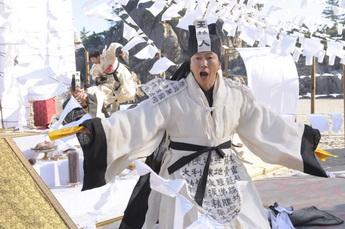 Ghost Sweepers is the third feature film directed by Shin Jung-won, following the crude but strangely affecting To Catch a Virgin Ghost and the indescribable Chaw. Which means that those who have seen these films should have a good idea of what they are getting into. One thing that might clue the profoundly wackoid nature of this motion picture to those who have not, is the fact that this film's premise was derived from a real life (?!) incident in which a group of Korean fortune-tellers and psychics in a rented bus got collectively possessed by spirits while passing by a location in Thailand. As it turned out, this location was famous for inexplicable traffic accidents. This possessed-psychics-in-a-tour-bus episode is actually in the first quarter of the movie, and is a fine set-piece, equal parts exciting, suspenseful, hilarious and, well, ridiculous beyond belief. Indeed, the whole movie is like The Ren & Stimpy Show meets The Big Bang Theory by way of David Lynch and Mario Bava, but minus the self-consciously artistic touches that characterize other pop-culture-inflected, candy-colored surrealist "horror" films such as Obayashi Nobuhiko's House.
Ghost Sweepers is the third feature film directed by Shin Jung-won, following the crude but strangely affecting To Catch a Virgin Ghost and the indescribable Chaw. Which means that those who have seen these films should have a good idea of what they are getting into. One thing that might clue the profoundly wackoid nature of this motion picture to those who have not, is the fact that this film's premise was derived from a real life (?!) incident in which a group of Korean fortune-tellers and psychics in a rented bus got collectively possessed by spirits while passing by a location in Thailand. As it turned out, this location was famous for inexplicable traffic accidents. This possessed-psychics-in-a-tour-bus episode is actually in the first quarter of the movie, and is a fine set-piece, equal parts exciting, suspenseful, hilarious and, well, ridiculous beyond belief. Indeed, the whole movie is like The Ren & Stimpy Show meets The Big Bang Theory by way of David Lynch and Mario Bava, but minus the self-consciously artistic touches that characterize other pop-culture-inflected, candy-colored surrealist "horror" films such as Obayashi Nobuhiko's House.
Unlike Chaw, which risked alienating a sizable portion of the viewers expecting a normal horror film, Ghost Sweepers, based as it is on the well-worn template of Ghostbusters and other supernatural comedy-thrillers, is easier to wrap your brain around, but not by much. Like Shin's previous films, the narrative lurches, hiccups and takes whatever detours necessary to bring in more character details and colorful episodes. The busy hand-held camerawork and the equally frenetic music score he employs this time and other seeming concessions to the contemporary genre trends are not very effective and in fact detract from the film's charms.
On the other hand, Shin Jung-won has lost little of his unique sensibility, which is put to best use in creating drop-dead funny, strangely persuasive and ultimately attractive characterizations. Thus, it is not surprising that Ghost Sweepers benefits tremendously from an ensemble of talented actors. Kim Soo-ro provides the perfect lead, a robustly charismatic presence who can be uproarious just doing a goofy martial arts routine by himself. Shin also unfurls some surprising relationships among the main characters, which should strike one as snickeringly fake in any realistic setting, but Lee Je-hoon, Kang Ye-won and other members of the cast somehow make them all work. The romantic attraction between the two, despite the manic comedy through which it is articulated, never feels strained. Equally original (if not really profound) is the portrayal of the head villain, the "revelation" of whose true identity to the protagonists is one of the film's best gags.
This being a Shin Jung-won film, of course, the ratio of knee-slappingly funny gags to what-the-heck-was-that head-scratching moments in Ghost Sweeper is around one to 2.5. As was the case with Chaw, if you have no tolerance for the kind of don't-ask-I-have-no-idea "quirky stuff" in a genre film (Seung-hee trying to bait a feral dog with cheese sticks [?] she is carrying around like ammunition [?!]: a long, slow motion take of Seok-hyun jumping into the ocean to save his paramour, which makes him look like a electrocuted frog spinning in the air: and so on), studiously avoid this film. To many others with more adventurous tastes, it is enthusiastically recommended. (Kyu Hyun Kim)
Sixty-something Sun-yi (theater actress Lee Young-ran) is enjoying the autumn of her life with her extended family in North America. One day she receives a call from Korea, concerning a country house in Gangwon Province once owned by her family. This triggers a flashback to 47 years ago. Being tubercular and reduced to poverty due to her father's business failure, teenaged Sun-yi (Park Bo-young, Scandal Makers), her little sister and mom (Jang Young-nam, Possessed, The Neighbors) was forced to relocate to a remote country house, owned by rich jerk Ji-tae (Yoo Yeon-seok, Horror Stories). Morose and lost in escapist fantasy, one day Sun-yi has an encounter with a feral boy with an inexplicably healthy body (Song Joong-gi, Frozen Flower). It turns out that a crazy biologist (is there any other kind?) had been conducting a strange, secret experiment involving wolves in the house. Could the boy be an outcome of this dastardly endeavor?
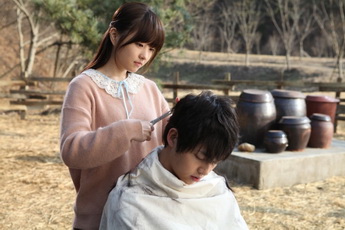 Despite mixed reviews from critics, A Werewolf Boy received overwhelming support from the young female demographic, making it one of the biggest domestic hits of the second half of 2012, with more than seven million tickets sold nationwide. I will be straightforward: if you hated the Twilight series (novels or cinematic adaptations), had never understood why young girls go crazy over them, and could not stand the conceit of "vegetarian vampires" who sparkle like a windowpane when hit by the sunlight, stay away from A Werewolf Boy. Let me reiterate: this is the story of a young Korean girl, consciously designed to be an avatar to which the contemporary teenage viewers could project their fantasies (little effort was made to conceive the character of Sun-yi as historically authentic in the context of '60s Korea), who gets to keep a perfect boyfriend for her: beautiful, mute (no talking back), practically immortal, and (literally) loyal like a lapdog. Waiting for some dark, psycho-sexual motifs to poke their snouts from behind the soft-focused, golden glow of the Gangwon mountain-scape? Trust me, they never do. And once we can clearly see the movie for what it is, it is no surprise that A Werewolf Boy was a box office smash. It is cleverly calculated to pluck heartstrings of the (pre-) pubscent female viewers, who will totally identify with Sun-yi, scream squeals of delight at the sight of the preternaturally pretty Song Joong-gi acting like a smart, but not too smart, Labrador retriever, and cry their eyeballs out at the climactic farewell scenes.
Despite mixed reviews from critics, A Werewolf Boy received overwhelming support from the young female demographic, making it one of the biggest domestic hits of the second half of 2012, with more than seven million tickets sold nationwide. I will be straightforward: if you hated the Twilight series (novels or cinematic adaptations), had never understood why young girls go crazy over them, and could not stand the conceit of "vegetarian vampires" who sparkle like a windowpane when hit by the sunlight, stay away from A Werewolf Boy. Let me reiterate: this is the story of a young Korean girl, consciously designed to be an avatar to which the contemporary teenage viewers could project their fantasies (little effort was made to conceive the character of Sun-yi as historically authentic in the context of '60s Korea), who gets to keep a perfect boyfriend for her: beautiful, mute (no talking back), practically immortal, and (literally) loyal like a lapdog. Waiting for some dark, psycho-sexual motifs to poke their snouts from behind the soft-focused, golden glow of the Gangwon mountain-scape? Trust me, they never do. And once we can clearly see the movie for what it is, it is no surprise that A Werewolf Boy was a box office smash. It is cleverly calculated to pluck heartstrings of the (pre-) pubscent female viewers, who will totally identify with Sun-yi, scream squeals of delight at the sight of the preternaturally pretty Song Joong-gi acting like a smart, but not too smart, Labrador retriever, and cry their eyeballs out at the climactic farewell scenes.
What's that? You are wondering if this is a horror film? Well, were you scared when you were watching Twilight? I think that answers the question for you. Of course, this is not to say that A Werewolf Boy is all saccharine fluff. Writer and director Jo Sung-hee, whose previous feature film End of Animal was noticed by many for its odd but eerie atmosphere, is firmly in control of the elements. None of the cute stuff seems to be added at the insistence of someone else, and is well integrated into the plot as well as characterization. Jo also wrangles child actors with remarkable ease, keeping the tone of their performances balanced against the adult actor's, pitched at a level that is larger-than-life but never campy.
He is less successful with the film's antagonists: he does try to imbue Ji-tae with some humanity but, despite Yoo's efforts, the latter never grows out of his aggressively fake-looking slicked-back hairdo. When the requisite werewolf action arrives, it is surprisingly well done, with minimum of the overcooked CGI effect that marred otherwise fine genre thrillers such as Chaw : it is too bad that these scenes are treated almost as an afterthought by Jo. I also wish that the grimy yet lightsome modernity of '60s Korea was captured with greater sophistication and verisimilitude. Even though the movie is beautifully shot and designed, it lacks the heft of a movie that truly grapples with the burden of the past.
A Werewolf Boy is neither An American Werewolf in London nor Truffaut's Wild Child, but once you have adjusted your expectations accordingly, you might be able to enjoy it as a junior-chick-flick fantasy cum melodrama. It's a perfect pajama party movie for your daughters, nieces or sisters in their teens. They will devour the movie alive and won't leave tufts of fur behind. I must say I do appreciate the movie's female-centered perspective, but I cannot help but wonder if the message its younger viewers are likely to draw from it are really empowering. A Werewolf Boy returns its heroine to the site of original bonding, confirming the validity of nostalgic invocation of the (unsullied) past and the (hierarchical) relationship based on taming and obedience. No doubt a potent fantasy for young Korean girls, the film's message might ultimately be a conservative one. Or it might just be that I am a cat person.
* Note: this review is based on the director's expanded cut of the movie, containing more character-revealing footage. (Kyu Hyun Kim)
"Gay bars in Jongno still don't have windows like these, huh?" This sarcastically biting comment is made by Won-gyu (Won Tae-hee - My Heart Beats, Fire in Hell), a gay Korean flight attendant with anti-social tendencies. The comment becomes ever more poignant when screened within the context of the upcoming Frameline 37, the San Francisco International LGBT Film Festival, at The Castro Theatre on June 20th. The Castro Theatre sits on the same block as the Twin Peaks Tavern, a gay bar that, as Marisa Lagos notes in a San Francisco Chronicle article (January 19, 2013) announcing the bar's recent national landmark declaration by the city of San Francisco, ". . . is believed to be the first gay bar in the nation to feature full-length, open plate glass windows that let its patrons look out, and more importantly, the public look in." Those windows created a reverse panopticon in 1972, 40 years before Won-gyu's quip in director Leesong Hee-il's White Night, a quip directed at how much further queer presence needs to move in South Korea, even in the somewhat, queer-friendly Jongno district of Seoul.
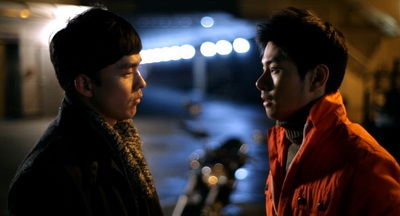 Won-gyu's anti-social tendencies have a context. Early on in the film, that's not clear, and you wonder why anyone would tolerate this jerk of a guy. He comes to Seoul for a 24-hour lay-over and initially meets up with a possibly former lover, (the ambiguity of relationships in this film is partly what makes it so compelling). Won-gyu shared a tragic incident with this man, the incident alluded to by the limp of this man's walk and by passing reference to someone getting "released" today. Won-gyu's conversation with this man is a cat and mouse game of tangential excursions in order for Won-gyu to avoid emotional connection and to avoid acknowledgment that he flew off first. Won-gyu eventually leaves this self-inflicted, ruined reunion. He takes a drag from his temporarily absent friend's cigarette. One tiny inhale of nicotine and Won-gyu exhales off to his lonely hotel room after taking the lighter returned to him, a sign that their relationship, their history, might have just officially ended.
Won-gyu's anti-social tendencies have a context. Early on in the film, that's not clear, and you wonder why anyone would tolerate this jerk of a guy. He comes to Seoul for a 24-hour lay-over and initially meets up with a possibly former lover, (the ambiguity of relationships in this film is partly what makes it so compelling). Won-gyu shared a tragic incident with this man, the incident alluded to by the limp of this man's walk and by passing reference to someone getting "released" today. Won-gyu's conversation with this man is a cat and mouse game of tangential excursions in order for Won-gyu to avoid emotional connection and to avoid acknowledgment that he flew off first. Won-gyu eventually leaves this self-inflicted, ruined reunion. He takes a drag from his temporarily absent friend's cigarette. One tiny inhale of nicotine and Won-gyu exhales off to his lonely hotel room after taking the lighter returned to him, a sign that their relationship, their history, might have just officially ended.
While in his hotel room, Won-gyu apparently found a willing sexual partner on the internet, for he meets a courier named Tae-jun (Lee Yi-kyung) at an agreed upon location with a secret codeword to elude public awareness of their shared sexual identity. Won-gyu's anti-social stroll drags this pending paramour to a male restroom where the younger gay man begins to re-consider this awkward one-night stand. "Can't we just go to a motel?" he confusingly asks. Won-gyu does one better, taking him to his hotel, but the tryst is no better performed in that private space. This continuing cat and mouse game of unlikely lovers dissipates as Won-gyu slowly reveals what happened in Seoul that led him to leave for the queer-freer confines of Germany two years ago.
Noted in a Q&A transcription found on the website Hanguk Yeonghwa, Leesong intended White Night to be part of a trilogy, but all 3 segments ended up longer than he initially expected, so Leesong released 3 full feature-length films instead. (The others are Suddenly, Last Summer and Going South.) The basic concept of the original omnibus film was to have 2 characters walking through different spaces for 6 hours. And a lot of walking goes on in White Night, initially punctuated by the sound of Won-gyu's luggage rolling along the cobblestone-y texture of the streets, adding an auditory trace to the space within which we witness the characters stroll. It is a languorous pace, as if the space, the place, the history, the present, is all being patiently soaked in by the characters. Yet the fact that the characters all walk while kept at a distance from each other underscores the emotional vulnerability lodged within these spaces.
White Night is based on a real-life gay-bashing incident that happened in the streets of Jongno in 2011 about which most South Korean viewers attending a screening would know. With the recent homophobic fatal shooting of Mark Carson in the West Village of New York City, White Night comes to the Castro at a particularly tenuous moment when we are re-calibrating how safe we truly are in even our queer-friendliest of spaces in the US. And one of the underlying challenges of White Night is to ponder if we can ever really escape the violence imposed on us by whatever hegemony surveils us. Confrontation, if not outright danger, lurks even in the places we think are more progressive.
In the upcoming book Directory of World Cinema: South Korea edited by Colette Balmain and in which I contribute, Gary Needham correctly notes that the existence of a Korean Queer Cinema "is still one of fantasy rather than reality" (p 163). Considering that Leesong continues to flesh-out multiple gay male lives, desires, histories, and futures within South Korean public and private spaces, White Night demonstrates that Korean Queer Cinema can indeed become a reality, as well as demonstrating that Leesong is a huge part of what continues to make South Korean cinema so important in the 21st century. (Adam Hartzell)
![]() The Winter of the Year Was Warm
The Winter of the Year Was Warm
The Winter of the Year Was Warm is a remarkable film, fashioned out of a remarkably ordinary premise. In-sung is a film producer and director based in Seoul who likes to escape the stress of the city each weekend by driving to the seaside town of Gangneung. He loves the relaxed atmosphere there, and especially the local food. One day he mentions to his friend, who runs a small cafe, that he is thinking about getting a second home in Gangneung, rather than pay for a hotel every weekend.
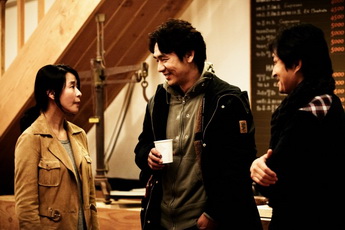 The cafe owner, meanwhile, has another friend named Yu-jeong who often stops by for coffee. Yu-jeong is a nurse in a Gangneung hospital, and though she is very committed to her job, on weekends she usually drives into Seoul to enjoy the cultural life. Typically she stays with a friend and visits an arthouse cinema or goes to see a performance. But one day, her friend informs her that she has a new boyfriend, and that Yu-jeong is no longer welcome to share her place. Yu-jeong reluctantly checks into a cheap motel.
The cafe owner, meanwhile, has another friend named Yu-jeong who often stops by for coffee. Yu-jeong is a nurse in a Gangneung hospital, and though she is very committed to her job, on weekends she usually drives into Seoul to enjoy the cultural life. Typically she stays with a friend and visits an arthouse cinema or goes to see a performance. But one day, her friend informs her that she has a new boyfriend, and that Yu-jeong is no longer welcome to share her place. Yu-jeong reluctantly checks into a cheap motel.
It is at a moment when the three of them are all together by chance that the cafe owner notes how In-sung and Yu-jeong's lives are like mirror images of each other. "You two should stay in each other's apartments each weekend, rather than booking motels," he says. In-sung thinks about it for a moment and likes the idea, but Yu-jeong can't quite imagine the idea of opening up her home to a stranger.
Romantic comedies and love stories typically revolve around a romantic relationship that takes shape in the course of the film, and which later undergoes some kind of test. Structurally, The Winter of the Year Was Warm develops in similar ways, with one key difference: the relationship at the center of the film is not a romantic relationship, it is the practical arrangement between the two characters to share their apartments. This may sound at first like the dullest of subjects. However, over the course of the film's 100 minute running time, director Cho Sung-kyu uses this as a means of fleshing out two convincing, nuanced, and highly likable characters.
After all, there is something quite intimate in letting someone stay in your home. Traces of your character exist in the bookshelves, in your refrigerator, and in the things hanging on the walls. Some of the best scenes in The Winter of the Year Was Warm are moments in which In-sung and Yu-jeong draw closer to each other, not by spending time together, but by passing time alone in each other's homes.
Lead actors Kim Tae-woo (Epitaph, Like You Know It All) and Yeh Ji-won (HaHaHa, Hanji, Nobody's Daughter Haewon) do a tremendous job of bringing these characters to life. Much of the film's warmth springs from the quiet, focused intensity of their acting. As the film director In-sung, Kim Tae-woo gives such a relaxed, naturalistic performance that at times it seems he is unaware of being the star of this film. But ultimately, this only makes the character more fascinating. As for Yeh Ji-won, most famous perhaps for her outwardly expressive performances in Turning Gate and Old Miss Diary, she projects an entirely new sort of image in this film by turning her emotions inward. Her tightly controlled charisma proves to be the perfect complement to Kim Tae-woo's friendly charm.
My personal experience of viewing this film was that as the story progressed, there was never any scene or moment that jumped out and impressed me with its dynamism or creativity. The film unfolds in a very ordinary setting, and I simply fell into the story without thinking very much about what I was watching. It was only when the film ended that I realized how much I actually liked it. For a work that shows such a casual disregard for the accepted rules of screenwriting, The Winter of the Year Was Warm proves to be unexpectedly good at storytelling. (Darcy Paquet)
A judge looks down from her bench at three juveniles who have been caught breaking into someone's home. As viewers, we already know that two of the three deserve punishment, but that the youngest, Jigu, is mostly just the victim of bad luck. Not only that, he's from a disadvantaged background, with no parents. He lives with his severely diabetic grandfather, who is almost helpless without Jigu's care. (As the judge says, "Who's looking after who in this family?")
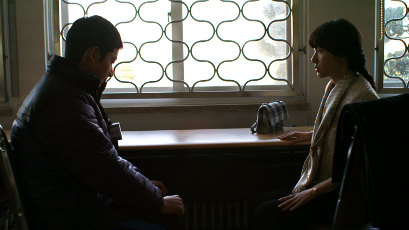 Jigu's life really does hang in the balance at this moment, and the judge makes what she believes to be the humane decision. After admonishing the parents of the other two boys, and giving them comparatively lighter sentences, she tells Jigu that he would be better off in a more disciplined and stable environment. She sentences him to a juvenile reformatory. At this moment, Jigu is mostly scared on behalf of his ailing grandfather, but perhaps he also senses that his uncertain path towards graduating from high school and leading a normal life is about to be derailed. "Can you forgive me just this once?," he asks the judge. Not for the last time in Jigu's life, the answer will be no.
Jigu's life really does hang in the balance at this moment, and the judge makes what she believes to be the humane decision. After admonishing the parents of the other two boys, and giving them comparatively lighter sentences, she tells Jigu that he would be better off in a more disciplined and stable environment. She sentences him to a juvenile reformatory. At this moment, Jigu is mostly scared on behalf of his ailing grandfather, but perhaps he also senses that his uncertain path towards graduating from high school and leading a normal life is about to be derailed. "Can you forgive me just this once?," he asks the judge. Not for the last time in Jigu's life, the answer will be no.
Juvenile Offender explores the effects of three unforeseen ruptures in Jigu's life, the first being his sentencing to the reformatory. Without ever feeling didactic, the film takes us briefly inside the system of juvenile punishment and shows us both how it works, and how it might not be working as it should. (The film was partly financed by the National Human Rights Commission of Korea.) Jigu, at any rate, does not seem to be healing or progressing in this environment. However, in an ironic twist, the reformatory will deliver something completely unexpected to Jigu. It will bring him into contact with his mother.
This is the second film by director Kang Yi-kwan, after his award-winning relationship drama Sa-Kwa (2005) which impressed critics and audiences with its thoughtful, introspective approach to storytelling. Like that film, Juvenile Offender is humane, moving and driven forward by some remarkable acting performances. Seo Young-joo, who plays Jigu, has the look of a teen star, although his career hasn't really started yet. A jury at the 2012 Tokyo International Film Festival awarded him a best actor prize, and it was no surprise to anyone who had seen the film. His acting is assured and completely natural, despite his young age.
Jigu's mother, named Hyo-seung, is played by Lee Jung-hyun, who is best known as a pop star, but who has also acted in a handful of remarkable films including Park Chan-wook and Park Chan-kyong's Night Fishing (2011), and Jang Sun-woo's A Petal (1996). In this film, she is given a nuanced, complex role, and she does amazing things with it. Hyo-seung's hold onto her life is precarious at best, and she has never had any experience of being a parent. Jigu's release from the reformatory throws her life into turmoil, but also fills a need in her. Lee's performance expresses fragility and strength, desperation and formidable will.
This developing mother-son relationship illuminates all the other issues raised in the film, from questions of upbringing and deprivation to those of retribution and responsibility. Jigu naturally craves information about his past; such information might usually help one feel more grounded in the world. Ironically, in Jigu's case, hearing about the identity of his father, or the origin of his unusual name (his grandfather mistakenly entered "Jigu" instead of "Jingu" into his birth records) might make his life seem even more like the product of arbitrary, random forces. But there is potential in his reunion with his mother. That they need each other is clear. What is less clear as we watch the film, is if they will be able to stay with each other. (Darcy Paquet)
"The torture movie" is how most international guests referred to this work when it premiered at the Busan International Film Festival in October 2012. Word of it spread quickly. "I can't imagine I'll ever want to watch it a second time. The torture lasts for almost 80% of the running time," said a critic to me at one of BIFF's parties. Then his expression turned serious. "But it's a tremendous film. It's an amazing achievement."
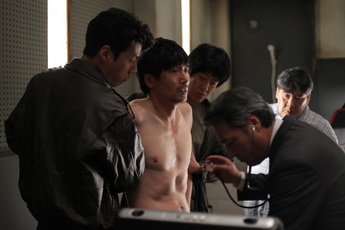 National Security is a fairly accurate retelling of the arrest and torture of political activist Kim Geun-tae for 22 days in the autumn of 1985 (in the film, he is referred to as Kim Jong-tae). Kim was one of the key participants in South Korea's democracy movement, which eventually forced the ruling military dictatorship to reform the Constitution and introduce direct presidential elections in 1987. Kim later embarked on a successful political career, winning a seat in the National Assembly in 1996 and serving as health minister under President Roh Moo-hyun from 2004-2006. However in the decades after being tortured he continued to suffer from the effects of posttraumatic stress disorder. He died in 2011 at the age of 64 from Parkinson's disease, which many believe to have been brought on as a result of the torture.
National Security is a fairly accurate retelling of the arrest and torture of political activist Kim Geun-tae for 22 days in the autumn of 1985 (in the film, he is referred to as Kim Jong-tae). Kim was one of the key participants in South Korea's democracy movement, which eventually forced the ruling military dictatorship to reform the Constitution and introduce direct presidential elections in 1987. Kim later embarked on a successful political career, winning a seat in the National Assembly in 1996 and serving as health minister under President Roh Moo-hyun from 2004-2006. However in the decades after being tortured he continued to suffer from the effects of posttraumatic stress disorder. He died in 2011 at the age of 64 from Parkinson's disease, which many believe to have been brought on as a result of the torture.
Most films are made for the purpose of entertaining their audience. Occasionally, a director may also want to enlighten viewers on a particular topic, or to present a political argument. National Security is certainly a political film, in that it was released during the presidential campaign of 2012, in which Park Geun-hye, the daughter of former dictator Park Chung Hee, was elected president. But at its most basic level I think this film presents its viewers with a specific request. The request is that we witness the torture that Kim experienced at the hands of government employees in the detention center at Namyeong-dong. In bearing witness to this crime, we may pay tribute to his sacrifice, and understand in some small way what he and so many other political prisoners suffered in this era.
I should explain, perhaps, about the torture. Watching it is quite difficult because of its realistic presentation and the stifling atmosphere that pervades the work. It's similar in some ways to the torture sequences in Kathryn Bigelow's Zero Dark Thirty, but much more lengthy and intense. On the other hand, I should reiterate that this is not Saw. There are no pulled fingernails. It's not bloody or gory, perhaps because it doesn't need to be. Lead actor Park Won-sang (Unbowed) makes us feel the suffocating sense of despair Kim experienced at that time, and in a controlled, subtle way he shows us both the ways in which Kim was broken, and the ways in which he was not.
I realize that at this point in the review, most readers might not be so tempted to seek this film out. But I do want to encourage people to see it - for me, this was the best Korean film of 2012. Director Chung Ji-young did a remarkable job with the characterization of the various people who appear in the film, so that despite ourselves we become absorbed and pulled along by the plot. The film's humanistic vision extends to the government workers who serve as Kim's captors, giving the work a much-needed emotional complexity. More than anything, what makes the difficult scenes in this film bearable is the sense that this is a work made primarily not out of anger, but out of empathy for what Kim experienced. The last ten minutes in particular are extremely moving. It's this empathy that turns National Security from an issue film, into something greater and more valuable. (Darcy Paquet)
Byun Sung-hyun's Whatcha Wearin'? is a romantic sex comedy, a variant of the romantic comedy. And considering some of the sexual topics discussed as opposed to shown in this comedy, see this as your warning that I have to mention acts that some folks might find less than pleasant. When you have a couple who cute-meet when Yoon-jung (Kim A-Joong, 200 Pounds Beauty, Steal My Heart) thinks she's making a kinky phone-sex call to her boyfriend but mis-dials and ends up heavy-breathing with a random male stranger Hyun-seung (Ji Sung, Blood Rain, Confessions), you have to expect that the conversation is going to get a tad risque.
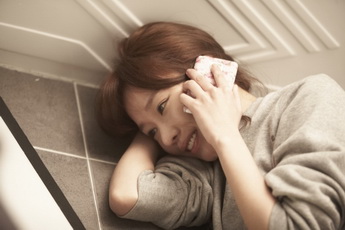 First, a personal story from my later teen years. Around my junior year in high school, I had a discussion with my parents about how I should be allowed to swear at home as long as it was at the computer. I presented my case that people make mistakes and I need to understand that. But computers, they are supposed to 'fucking work!' My parents, bless them, thought it over and approved my request. There was one caveat, or more accurate, there were two caveats, two words my parents would not allow. The first was 'Jesus', which I understood, and I wasn't someone who was in the habit of uttering his name in anger or pain so I was cool with that. But the other word confused me.
First, a personal story from my later teen years. Around my junior year in high school, I had a discussion with my parents about how I should be allowed to swear at home as long as it was at the computer. I presented my case that people make mistakes and I need to understand that. But computers, they are supposed to 'fucking work!' My parents, bless them, thought it over and approved my request. There was one caveat, or more accurate, there were two caveats, two words my parents would not allow. The first was 'Jesus', which I understood, and I wasn't someone who was in the habit of uttering his name in anger or pain so I was cool with that. But the other word confused me.
"Don't say 'sucks'", my mother instructed.
"Sucks?" I was confused, "What's wrong with that word?"
"Oh, you know!", said my mother, eyes-widening then shaking her head.
This prompted images of my parents I never wanted put in my mind. It was now my turn to shake my head, vigorously, in order to ward off such images from ever returning.
In Analyze This (Harold Ramis, USA, 1999), Robert de Niro's married character informs his therapist, played by Billy Crystal, that he also has a girlfriend to "...do things to her that I can't do with my wife." When the therapist asks de Niro's character why he can't do those things with his wife, his response echoed the mores of my parents' generation - "Hey, that's the mouth she kisses my kids goodnight with!" My parents' generation had a very different idea about fellatio. Out of their culture and time "sucks" would be a curse word. My parents' generation still saw fellatio as something you received from a prostitute. These sexual mores repressing sexual urges gradually fell by the wayside with a large segment of later generations. Many in my generation find such ideas of past generations incomprehensible, if not laughable.
I bring all this up because the dialogue in Whatcha Wearin'? surprised me in its casual discussion of such topics as, well, pardon me, but it is discussed in the movie, ejaculating on a partner's face. The frankness of this dialogue had me thinking of the parked car scene in My Love, My Bride, (the original from 1990 directed by Lee Myung-se, not the 2014 remake by Lim Chan-sang which I have yet to see), where Park Joong-hoon's character tries to get his wife to fellate him. The scene ends in frustration rather than satisfaction. Fellatio at that time in South Korea was still considered something only bad girl's did, and one's wife is not supposed to be a 'bad girl'. Whatcha Wearin'? has the couple comfortably discuss sexual acts beyond the wet dreams of Park's character in My Love, My Bride. If we consider whatcha watchin' with Whatcha Wearin'? on a continuum of South Korean romantic comedies, we have reached the point where a couple discussing 'golden showers' might be next. (If you've seen the 2016 romantic sex comedy Kiki, Love to Love directed by Paco Leon, you know that Spain is already there. And if you've been paying attention to the frightening constitutional crisis in my own country, you know that certain, ahem, leaked CIA documents claim our fearful president has gone there too.) This progression makes sense when you think of how sex comedies are based on shock value. (Apple-pie-assisted male masturbation, anyone?) The acts discussed or displayed must get more outrageous with each passing film. As much as Whatcha Wearin'? is not a great movie, it is a movie to be considered when weighing the portrayals of changing sexual norms in South Korean cinema. (Does this reflect changing mores in South Korean society itself? I'll leave that to the sociologists whose studies I have yet to read.)
Along with the trajectory of sexual acts described, Whatcha Wearin'? provides a nice data point in South Korean cinema regarding portrayals of women's sexuality. Neither the main female character of Yoon-jung nor the woman who rejects our main male character, So-yeon (Shin So-yul, Penny Pinchers, A Violent Prosecutor), are punished for acting on their sexual desire. This is not Yoon Je-kyun's Sex Is Zero (2002), a sex comedy with its disturbing mood shift late in the film to teach some lesson that you better not make sex important in your life because, . . . I don't know, ask Yoon.
Whatcha Wearin'? could be an interesting pedological tool for teaching young adults about consent. It's not that the film didactically teaches consent. It's that certain scenes allow for discussions regarding where consent exists, how consent shifts, and how to be better aware that consent has been confirmed. The abovementioned scene early on in the film between Yoon-jung and Hyun-seung about where the trajectory of ejaculation is permitted by Yoon-jung is a good example. Yoon-jung is able to explain to Hyun-seung what practices she's ok with and what she's not ok with, along with giving Hyun-seung a perspective that the porn he watches hasn't provided. The meet cute of a mistaken-identity phone sex call ironically enables this couple to talk through their desires and wants before they act on them, resulting in fewer mixed messages when they finally consider consummation. The medium of the phone allows for greater communication before their bodies do the talking.
Still, there are problematic moments. The discussion amongst Hyun-seung's friends of women being 'holes', if translated correctly, is disturbing, but just as disturbing is that Hyun-seung, the main male character we are supposed to align with and root for, never intervenes on this misogyny, leaving it to sit there as if to be accepted that men just talk this way. It's supposed to be seen as funny when it's anything but.
Whatcha Wearin'? is the type of film I usually quickly toss off to a used DVD store. A movie I watch because I have to since I focus much of my writing on South Korean cinema. The fact that it surprised me as an intriguing film to consider when thinking about sexuality on Korean screens is why I consent to even the crappiest South Korean film hoping by chance that it inspires my writing in some small way. (Adam Hartzell)